

My WHY is to develop current and future leaders into highly effective leaders so that, they can develop current and future leaders into highly effective leaders.
One of my vehicles to do that is through my leadership & personal growth coaching programme.
I am a coach, and chartered engineer, and I work with people who want to develop themselves into a highly effective leader.
Together I coach them on how to;
-Grow in their career,
-Lead themselves to the best of their ability,
-Grow their people to be their best.
I coach my clients on how to develop their character so they can make the right decisions for themselves, their people and beyond.
My leadership & personal growth coaching programme has been designed to provide a high level of personalised support, I will give my best 100% of the time to help you achieve your goals.
Some wins we have had through my coaching:
- Clients being able to learn more about themselves and be clear on where they want to go.
- Helping clients navigate challenges and seize opportunities to help develop their people with confidence.
- Clients being able to increase their positive influence within their people and through their organisation.
There are 5 ways I can help you:
1. I give away a lot in my content- so click the notification bell on my profile to keep up with the latest.
2. You can click the link below to access my FREE Content.
3. You can click the link below to access my "Highly Effective Leader Amazon Book Series".
4. You can join my leadership & personal growth coaching programme- DM me to find out more.
5. You can subscribe to my YouTube Channel and study my videos on Leadership & Personal Growth.
All my love and best,
Tom
My Email: tom@highlyeffectiveleader.com
My Free Content: https://highlyeffectiveleaderresources.com/free-content
My Calendar: https://calendly.com/highlyeffectiveleader/coaching-discovery-call
My "Highly Effective Leader Amazon Book Series": https://www.amazon.com/dp/B0CZMXDL5X
My YouTube Channel: https://www.youtube.com/@LeadershipGrowth
Available For: Advising, Authoring, Consulting, Influencing, Speaking
Travels From: London
Speaking Topics: Leadership, Personal Growth, Influence
| Tom Lawrence | Points |
|---|---|
| Academic | 0 |
| Author | 676 |
| Influencer | 240 |
| Speaker | 261 |
| Entrepreneur | 0 |
| Total | 1177 |
Points based upon Thinkers360 patent-pending algorithm.
 What Are People Striving Towards?
What Are People Striving Towards?
Tags: Culture, Leadership, Transformation
 Do You Neglect Your Strengths?
Do You Neglect Your Strengths?
Tags: Culture, Leadership, Transformation
 How To Avoid Team Disappointment
How To Avoid Team Disappointment
Tags: Culture, Leadership, Transformation
 Why Don't We Develop Others?
Why Don't We Develop Others?
Tags: Culture, Leadership, Transformation
 Why Don't We Develop Ourselves?
Why Don't We Develop Ourselves?
Tags: Culture, Leadership, Transformation
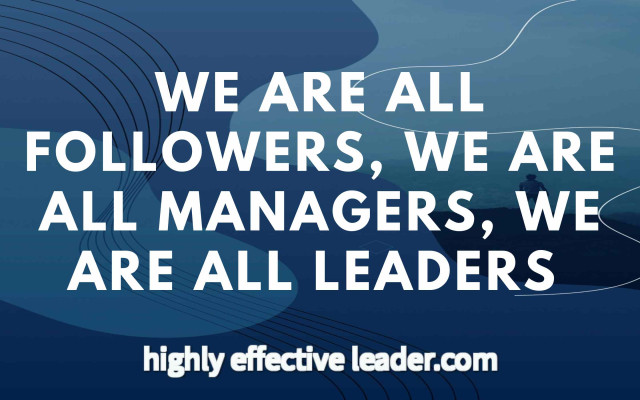 Management & Leadership
Management & Leadership
Tags: Culture, Leadership, Transformation
 How Far Do You Want To Climb?
How Far Do You Want To Climb?
Tags: Culture, Leadership, Transformation
 Will Leaders Give Them The Answer?
Will Leaders Give Them The Answer?
Tags: Culture, Leadership, Transformation
 Influence & Leadership
Influence & Leadership
Tags: Culture, Leadership, Transformation
 A Leader's Focus
A Leader's Focus
Tags: Culture, Leadership, Transformation
 Culture Ambassadors
Culture Ambassadors
Tags: Culture, Leadership, Transformation
 How Do You Set Goals?
How Do You Set Goals?
Tags: Culture, Leadership, Transformation
 How Do You Raise Your Awareness?
How Do You Raise Your Awareness?
Tags: Culture, Leadership, Transformation
 Motivation Of The Team
Motivation Of The Team
Tags: Culture, Leadership, Transformation
 How Do You Reward Great Results?
How Do You Reward Great Results?
Tags: Culture, Leadership, Transformation
 Inspire Your People
Inspire Your People
Tags: Culture, Leadership, Transformation
 Staying An Attractive Team
Staying An Attractive Team
Tags: Culture, Leadership, Transformation
 Do You Replace Your Team Or Develop Them?
Do You Replace Your Team Or Develop Them?
Tags: Culture, Leadership, Transformation
 Don’t Hold Your Team Back
Don’t Hold Your Team Back
Tags: Culture, Leadership, Transformation
 Are You Positive Or Negative?
Are You Positive Or Negative?
Tags: Culture, Leadership, Transformation
 Changing The Team
Changing The Team
Tags: Culture, Leadership, Transformation
 From Leader To Transformer
From Leader To Transformer
Tags: Culture, Leadership, Transformation
 A Quitter Never Wins - A Winner Never Quits
A Quitter Never Wins - A Winner Never Quits
Tags: Culture, Leadership, Transformation
 From Team Player To Leader
From Team Player To Leader
Tags: Culture, Leadership, Transformation
 How Are You A Decision Maker?
How Are You A Decision Maker?
Tags: Culture, Leadership, Transformation
 The Young Leader - Inspiring 13 To 23 Year Old's To Grow Into Highly Effective Young Leaders
The Young Leader - Inspiring 13 To 23 Year Old's To Grow Into Highly Effective Young Leaders
Tags: Culture, Leadership, Transformation
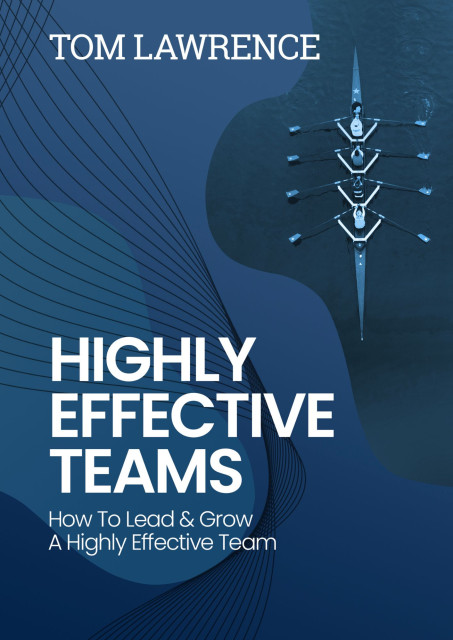 Highly Effective Teams - How To Lead & Grow A Highly Effective Team
Highly Effective Teams - How To Lead & Grow A Highly Effective Team
Tags: Leadership, Management, Transformation
 The Team Player: How To Become A Highly Effective Team Player
The Team Player: How To Become A Highly Effective Team Player
Tags: Leadership, Project Management
 Influence Is Leadership: Become The Highly Effective Leader That Others Want To Follow
Influence Is Leadership: Become The Highly Effective Leader That Others Want To Follow
Tags: Leadership, Project Management
 A Limitless Mindset - How A Highly Effective Leader Thinks
A Limitless Mindset - How A Highly Effective Leader Thinks
Tags: Leadership, Management
 Manager To Leader: How To Become A Highly Effective Leader
Manager To Leader: How To Become A Highly Effective Leader
Tags: Leadership, Project Management
 Your Young Leaders
Your Young Leaders
Tags: Culture, Leadership, Transformation
 Serve Your People
Serve Your People
Tags: Culture, Leadership, Transformation
 Your Team Purpose
Your Team Purpose
Tags: Culture, Leadership, Transformation
 Your Leadership Position
Your Leadership Position
Tags: Culture, Leadership, Transformation
 See Your Future
See Your Future
Tags: Culture, Leadership, Transformation
 Increase Your Value
Increase Your Value
Tags: Culture, Leadership, Transformation
 Grow Your Mindset
Grow Your Mindset
Tags: Coaching, Leadership, Transformation
 Increase Your Influence
Increase Your Influence
Tags: Coaching, Leadership, Management
 Leadership Of Yourself
Leadership Of Yourself
Tags: Coaching, Leadership, Transformation
 Grow Your Career
Grow Your Career
Tags: Careers, Leadership, Transformation
 Grow Your People
Grow Your People
Tags: Coaching, Leadership, Management
 INSPIRE YOUR PEOPLE
INSPIRE YOUR PEOPLE
Tags: Leadership, Project Management
 How Do You Develop Your Followers Into Leaders?
How Do You Develop Your Followers Into Leaders?
Tags: Culture, Leadership, Transformation
 How Do You Listen To Understand Your People?
How Do You Listen To Understand Your People?
Tags: Culture, Leadership, Transformation
 How Much Courage Do You Have To Lead?
How Much Courage Do You Have To Lead?
Tags: Culture, Leadership, Transformation
 How Important Is Success To You?
How Important Is Success To You?
Tags: Culture, Leadership, Transformation
 How Do You Know You Have The Right People In Your Team?
How Do You Know You Have The Right People In Your Team?
Tags: Culture, Leadership, Transformation
 How Are You Transforming Your Team's Culture?
How Are You Transforming Your Team's Culture?
Tags: Culture, Leadership, Transformation
 What Do You Think The Foundation Of Leadership Is?
What Do You Think The Foundation Of Leadership Is?
Tags: Culture, Leadership, Transformation
 What Does Connecting With Your People Mean To You?
What Does Connecting With Your People Mean To You?
Tags: Culture, Leadership, Transformation
 How Much Do You Love Yourself?
How Much Do You Love Yourself?
Tags: Culture, Leadership, Transformation
 How Often Do You Look Inward As A Leader?
How Often Do You Look Inward As A Leader?
Tags: Culture, Leadership, Transformation
 When Did You Stop Being Educated?
When Did You Stop Being Educated?
Tags: Culture, Leadership, Transformation
 How Important Is Sacrifice For A Leader?
How Important Is Sacrifice For A Leader?
Tags: Culture, Leadership, Transformation
 How Do You Begin Your Transformation?
How Do You Begin Your Transformation?
Tags: Culture, Leadership, Transformation
 How Important Is Connection With People?
How Important Is Connection With People?
Tags: Culture, Leadership, Transformation
 How Do You Teach Your People?
How Do You Teach Your People?
Tags: Culture, Leadership, Transformation
 How Are You The Right Kind Of Role Model?
How Are You The Right Kind Of Role Model?
Tags: Culture, Leadership, Transformation
 What Do You Think Helps You To Become Successful?
What Do You Think Helps You To Become Successful?
Tags: Culture, Leadership, Transformation
 How Do You Connect With Your People?
How Do You Connect With Your People?
Tags: Culture, Leadership, Transformation
 When Will You Grow From Potential To Reality?
When Will You Grow From Potential To Reality?
Tags: Culture, Leadership, Transformation
 How Important Is The Potential Of Your People To You?
How Important Is The Potential Of Your People To You?
Tags: Culture, Leadership, Transformation
 How Are You Building Momentum With People?
How Are You Building Momentum With People?
Tags: Culture, Leadership, Transformation
 What Is The Foundation Of Leadership?
What Is The Foundation Of Leadership?
Tags: Culture, Leadership, Transformation
 Are You A Motivator Or A Manipulator?
Are You A Motivator Or A Manipulator?
Tags: Culture, Leadership, Transformation
 How Do You Focus On Your Own & Your Team's Growth?
How Do You Focus On Your Own & Your Team's Growth?
Tags: Culture, Leadership, Transformation
 Who Do You Believe Leadership Is About?
Who Do You Believe Leadership Is About?
Tags: Culture, Leadership, Transformation
 How Leaders Set Their Vision - Online Course
How Leaders Set Their Vision - Online Course
Tags: Coaching, Leadership, Transformation
 How Leaders Influence Great Results - Online Course
How Leaders Influence Great Results - Online Course
Tags: Coaching, Leadership, Transformation
 How Leaders Live Their Message - Online Course
How Leaders Live Their Message - Online Course
Tags: Coaching, Leadership, Transformation
 Build Your Team Of Leaders - Online Course
Build Your Team Of Leaders - Online Course
Tags: Coaching, Leadership, Transformation
 The Growth Mindset For Leaders - Online Course
The Growth Mindset For Leaders - Online Course
Tags: Coaching, Leadership, Transformation
 How Leaders Influence Positive Culture - Online Course
How Leaders Influence Positive Culture - Online Course
Tags: Coaching, Leadership, Transformation
 How Leaders Build Trust - Online Course
How Leaders Build Trust - Online Course
Tags: Coaching, Leadership, Transformation
 Grow A Leader's Confidence - Online Course
Grow A Leader's Confidence - Online Course
Tags: Coaching, Leadership, Transformation
 The Character Of A Leader - Online Course
The Character Of A Leader - Online Course
Tags: Coaching, Leadership, Transformation
 Outside A Leader's Comfort Zone - Online Course
Outside A Leader's Comfort Zone - Online Course
Tags: Coaching, Leadership, Transformation
 How Leaders Lead Change - Online Course
How Leaders Lead Change - Online Course
Tags: Coaching, Leadership, Transformation
 A Leader's Discipline - Online Course
A Leader's Discipline - Online Course
Tags: Coaching, Leadership, Transformation
 Are You An Action Taker?
Are You An Action Taker?
Tags: Culture, Leadership, Transformation
 How Do You Lead By Example?
How Do You Lead By Example?
Tags: Culture, Leadership, Transformation
 You Can Influence Anybody
You Can Influence Anybody
Tags: Culture, Leadership, Transformation
 How Do You Master Your Emotions?
How Do You Master Your Emotions?
Tags: Culture, Leadership, Transformation
 How Much Have You Overachieved?
How Much Have You Overachieved?
Tags: Culture, Leadership, Transformation
 Do You Get Along With Your Team?
Do You Get Along With Your Team?
Tags: Culture, Leadership, Transformation
 Do You Know Who You Are?
Do You Know Who You Are?
Tags: Culture, Leadership, Transformation
 Listen To Understand
Listen To Understand
Tags: Culture, Leadership, Transformation
 The Foundation Of Leadership
The Foundation Of Leadership
Tags: Culture, Leadership, Transformation
 How Do You Achieve Great Results?
How Do You Achieve Great Results?
Tags: Culture, Leadership, Transformation
 Leaders Create Leaders
Leaders Create Leaders
Tags: Culture, Leadership, Transformation
 How To Keep Your Team Motivated
How To Keep Your Team Motivated
Tags: Culture, Leadership, Transformation
 How Do You Embrace Change?
How Do You Embrace Change?
Tags: Change Management, Leadership, Transformation
 How Driven Are You?
How Driven Are You?
Tags: Culture, Leadership, Transformation
 How Much Do You Know?
How Much Do You Know?
Tags: Culture, Leadership, Transformation
 Increase Your Influence With Trust
Increase Your Influence With Trust
Tags: Culture, Leadership, Transformation
 How Do You Inspire Your Team?
How Do You Inspire Your Team?
Tags: Culture, Leadership, Transformation
 Grow Your Team Through Delegation
Grow Your Team Through Delegation
Tags: Culture, Leadership, Transformation
 Make Decisions As A Team
Make Decisions As A Team
Tags: Culture, Leadership, Transformation
 Empower Your Team, Empower Yourself
Empower Your Team, Empower Yourself
Tags: Culture, Leadership, Transformation
 Leadership Is Not A Race
Leadership Is Not A Race
Tags: Culture, Leadership, Transformation
 Communication Or Connection?
Communication Or Connection?
Tags: Culture, Leadership, Transformation
 Who Are You On The Inside?
Who Are You On The Inside?
Tags: Culture, Leadership, Transformation
 How Does Your Team See You?
How Does Your Team See You?
Tags: Culture, Leadership, Transformation
 How To Connect With Others
How To Connect With Others
Tags: Culture, Leadership, Transformation
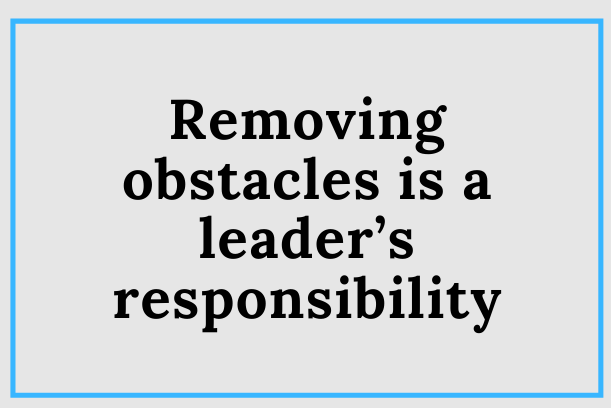 Are You Setting The Direction?
Are You Setting The Direction?
Highly effective leaders recognise the obstacles on the journey to success, and take responsibility for removing those obstacles, so that the journey flows as smoothly as possible.
Highly effective leaders set and control the direction of the journey from the front.
What would you do right now to improve yours and your team’s work situation? Have you spoken to your team about what changes they would like to see improved? Whenever I asked that question of a new team I was leading, I would get answers like:
There are lots more answers I have heard from teams that are a more trivial. But, the six above are the most common. The reason I would ask those questions first, is because these answers are a reflection of what their previous “leader” didn’t do for them.
They were managed by a low performing leader who didn’t listen to the team, and didn’t ask them what they would like to see improved. So, the first thing I would do after hearing these answers, was to do as much as possible to rectify them. This would be part of my building a relationship, and building trust with the team.
The things above are not big things to rectify, especially saying thank you when the team does a good job. That should be a given to any leader. A low performing leader doesn’t think that the list above is important, there a bigger things to concentrate on.
However, a highly effective leader knows that these little things, are actually the big things according to their team. So, they should be prioritised.
If you have a team in your charge, and you don’t think that the list above is important, then you are going to have a very difficult time influencing them. The list above is absolutely massive. It is the items on this list that are getting in the way of you building trust, and building relationships with your team.
They are obstacles between you, and your ability to influence the team. If you don’t remove these obstacles, this will send a very powerful message. You are basically telling your team “I don’t care for you.” Or, “you don’t really matter to me.”

If you haven’t already, go to your team and ask them individually “How can I help you make your job and the team’s job better?” You might get a few strange looks at first, but explain to them that you want to see things improved.
Tell them that you are willing to do as much as you can to make that happen. If you get some answers from the team that are madness, just write it down. Following that, go through the list with the team and prioritise 10 items.
Next, be the leader you always wanted to be, and go out and make everything on the list of 10 happen. If there is an item(s) that you can’t make happen for some reason, don’t worry. Just go back to the team and explain the reasons why, and discuss another way you can help.
Or, look at the other items on the original list and pick one to replace it. By doing this, you are continuing to build relationships. You are continuing to build trust.
You are increasing your influence with your team. If you don’t explain to them why you couldn’t make something happen, then you are decreasing your influence. Your relationship and trust building will decrease too.
As you are striving to become a highly effective and servant leader, you will start to realise the other obstacles that you can remove. The team may have not mentioned them to you, because they might not realise that you can help remove these obstacles.
So what they have done over the years is just work around them. They have gotten so used to working around these obstacles over time, that they don’t even notice it anymore.
A highly effective leader who takes responsibility for going the extra mile for their team, is the only person who can remove these obstacles. One of the most important roles for a highly effective leader is to look for obstacles that they can remove, for both themselves and their team.
When we discussed the leader walking around and asking questions, that is exactly what he/she is doing. They are looking for obstacles to remove, so that they can help to help improve the job, and the working environment for their team.
When a leader removes these obstacles, and it helps the team perform better, it is a win-win situation. The leader will start to perform better too, and the organisation will recognise this. It improves the leader’s star status.
A low performing leader who doesn’t take responsibility for going the extra mile, and is satisfied with getting the job done, cannot remove these obstacles. They live and hope that nobody ever knows about these obstacles, so that they are not expected to help remove them.
The team actually believes that their manager can’t remove them, so they will never talk about them. The manager does not want more work, he/she just wants an easy life, and get paid at the end of month.

When I was an engineering production manager in Scotland, our line manager was very insecure. He told us he wanted “us” to improve things, and when we tried he didn’t approve of anything.
He was not a leader at all, and would often talk about people behind their backs. He would even do this when the person’s teammates were in the room.
When we had the morning meetings to discuss the work for the day, he would show up sometimes just to give us an extremely hard time. Usually because the trains had performed badly the previous day. He would never concentrate on what was going well, he would only ever talk about what didn’t go well.
He was a very negative person. I would sometimes react to this, and suggest ways to improve the situation. However every time I would do this, he would knock me down. To me he was the obstacle, and he needed to be removed.
What I remember most about this line manager was, he brought me into his office to give me a hard time about my performance as an engineering production manager. The teams and my colleagues actually liked my work, but he didn’t.
Anyway, the trains were not performing well, so he thought because I was the new guy that it was my fault. He said “I brought you here to change things.” I replied “I am trying to change things, but you keep knocking every suggestion I make.”
He said “That’s because what you’re suggesting isn’t good enough.” When he said that, my heart sank, and I walked out of the office. I had never felt so bad.
A highly effective leader would not talk to their team members like that. They would ensure that they are not an obstacle to them. They would help to remove obstacles, so that their team member has the opportunity to improve. They listen to the team, as the team are discussing new ideas, and solutions to problems.
If you’re a highly effective leader, removing obstacles is not your job. It’s your responsibility. Will you help your team, so they can help you?
If you are a highly effective, servant leader then you will realise that you are there to help them. Please take on board that, removing obstacles is not your job, it is your responsibility.
I welcome hearing how this post has influenced the way you think, the way you lead, or the results you have achieved because of what you’ve learned in it. Please feel free to share your thoughts with me by commenting below.
All the best,
Tags: Culture, Leadership, Transformation
 How To Add Value To Others
How To Add Value To Others
People from all over the world debate what exactly a leader is, and they do this every day. When you think of our “world leaders”, would you actually call them “world leaders?” Do you really want to follow them? Because, that is exactly what a leader is, a person who has followers.
A leader is not a person who has people reporting into them, or someone who has the title of supervisor or manager. Do you have followers right now?
To be a leader, you must add value to others, and it is really important what you value. That’s the difference between a leader and a boss. I bet that right now you are wondering whether your line manager or your boss adds value to you, it’s only natural to think that.
Try not to think about it, it will draw up things that you might blame them for, or might like them less for. It’s important that you keep an open mind here.
Rather than think if your boss adds value to you or not, think about how you can add value to them. By that I mean, how can you help your boss? What can you offer to him/her in terms of help that will add value? My main purpose for this section is for you to think a bit differently here.
I want you to look within, and think about yourself. My articles are not just about being a leader at work, it is about being a leader in life also. Whether you’re at home, out with friends or on holiday. We need to be the same person and display the same leadership qualities wherever we are and whoever we are with.
Do you know the difference between a boss and a leader? If you do, what would you rather be? What do you value? If you value having the position, job title and power over the team, then you will be a boss.
If you value having a positive influence on the team, then you will be a leader. That’s a decision you have to make, so make the right decision because this is where you create the future you really want.

The difference between a boss and a leader is how they make us feel. If you have children, or young members of the family, even though they are not leadership experts, they can tell the difference between a boss and leader….believe me.
On many occasions throughout my career, I worked with more bosses than I did leaders. I know this because they made me feel:
On the other occasions when I did work with a leader, I know I did because they made me feel:
Think back to when you were a child, and when you were with your parents. Could you tell if they were leaders or bosses? Was one of your parents a leader and the other a boss? My mother is definitely a leader and a boss at the same time, depending on who she is talking to (I have three older brothers), or if we were being naughty.
I definitely follow my mother. My father is definitely a leader because he did so much for us and helped us in his own unique way, and he is one of the reason’s I am building this website and helping others. I want to do so much to help you.
Are you a parent? If you are, then be honest with yourself. Does your child or children consider you a leader or a boss? When your children look at you every day, what do they see? If you look at the two lists above, how do you make your children feel? Do you care how you make your children feel?
As a hard worker working in your current position and team, your line manager or supervisor sometimes has to be a leader and sometimes has to be a boss depending on the situation. What is he/she the most?
Do they lead at the right times? Do they boss at the right times? You can tell this because when they are leading, they are selling, and when they are bossing, they are telling.
To be a leader within the team, your team members will be the ones who determine this. They do this because they will know that you believe in them, and you make them feel great.
If people feel great around you then your leadership and your influence increases. If they feel bad around you then your leadership and influence decreases.
So, when you interact with people, even if the conversation is not about a pleasant topic, you need to apply your leadership principles to ensure the person you are interacting with still feels good around you.
If you can do that, then your people will definitely spread a positive message about you.
If you are reading this and you are a supervisor/team leader or you are a manager, then be honest with yourself. Does your team look at you and see a boss or a leader? Does your team feel great when they are around you? Does your team feel bad when they are around you?

How much do you care about how you make them feel? How do you feel when you are around your team? It is a two way street, but to make your team feel great, you really need to care about them.
Be the leader that you want to see in others. Your leader may or may not be a great leader, but that shouldn’t stop you being a great leader. If you have a team of your own, change yourself so you are that leader you wish you always had.
As I have said before, leading yourself and leading people is not about the position or the job title. Leading you and leading people is about the decision that you make on a daily basis.
Before I took up the position of a supervisor or a manager in my career, I always questioned myself if I had what it takes to be a leader. I knew I could be, but at that moment in time, “did I fit the mold?” I would ask myself.
Ask yourself, if you have a position of a supervisor/manager or not, do you think you fit the mold right now of a leader?
To be a highly effective leader takes courage. To be a highly effective leader takes confidence. To be a highly effective leader, you must have the ability to listen to the needs of others. To be a highly effective leader, you must have the empathy and the compassion to understand the needs of others.
Go through the two lists above, and be honest with yourself. Are you striving to become a highly effective leader leader, RIGHT NOW?
I welcome hearing how this post has influenced the way you think, the way you lead, or the results you have achieved because of what you’ve learned in it. Please feel free to share your thoughts with me by commenting below.
All the best,
Tags: Culture, Leadership, Transformation
 Beat Your Targets, Don't Meet Your Targets
Beat Your Targets, Don't Meet Your Targets
Within the world of business, no matter what industry you are in, there is always some continuous improvements/targets/milestones wanting to be met.
For example, in the rail industry where I have worked most of my career, the targets for engineering are: number of delay minutes a day, making service with a specific amount of trains each day, and reducing the amount of technical issues. These all had daily, weekly and monthly targets.
I’m sure that whatever industry you work in, your organisation has daily, weekly and monthly targets too. However, we ALL have team and individual targets, and these are usually called objectives.
A very corporate term, but they are there for a reason. They are there to measure our performance and also to figure out what kind of development we need. Most of the people I worked with didn’t care about objectives, but I did and so should you.
When we are set a target, or an objective, we usually try to find a way to meet that target or to just about achieve it.
But, I am saying that we should find a way to beat that objective or target, not just meet it. We are striving to be excellent, so we should know how to make things happen.
Now, we don’t just want to make things happen, we want to make things happen quicker and better than what our boss expected. Imagine how much you could increase your influence if you not only beat your targets, but you did it sooner.
Not only that, the trust you will build with your boss and the team will increase too.

Doing tasks or beating targets sooner than your boss expected helps you build trust. Trust is the foundation of leadership and influence. So your foundation of trust will rise, and be of great benefit for you in the future.
Which means, you will be given a lot more responsibility and again you will be known as the leader within your team.
Your boss will increase the amount of confidence they have in you if you can beat their expectations sooner. You will be the first person they ask for help. You will be the first person they ask for an opinion. You will be the first member of the team they listen to.
As we have discussed before, your responsibility level will rise and your influence will increase.
Don’t be the person who doesn’t care when they complete their objectives or tasks. Having an attitude like that will only create distrust between you and your boss, and your influence will decrease.
Your boss will lose confidence in you and then they won’t ask you for help, they won’t raise your level of responsibility, and they won’t ask your opinions on things.
The leaders who don’t have any trust with anybody, but still have influence, only do so because they are in a certain position or they have a certain job title. People only follow them because they have to, and that is no way to lead.
They only lead through fear, manipulation or intimidation. There is absolutely no foundation of trust, and their influence is very negative. Again, don’t let that be you.
Throughout this site I am sharing leadership principles with you, and every single one of them gives you the tools to create trust within your team. They give you the tools to create trust with your boss.
They give you the tools to create trust with your friends, family, and within your community too. If you don’t apply these principles throughout your life then you will create distrust.
You have the character to lead and influence your people, and you are learning the principles to go with that character. When you can match both, it doesn’t matter what position you hold or what job title you have.
There is no such thing as leading people through manipulation, fear or intimidation. Your team members, organisation, family, friends, and community will want to follow you because of who you are.
They will follow you because they want to, not because they have to. Leadership and influence is based on trust, and through building your character so you can build trust with others.
It won’t matter what level of authority you have, whether you’re a team member, a supervisor or a manager. Anybody in any industry can lead people this way.
Being a team member and beating your targets or objectives sooner than was expected, that is the best place for you to build trust and increase your influence. You don’t need to have a job title or position to do that.

Your boss is your number one customer remember, so all you need is the passion and the will to put in the extra effort. You must be willing to make the sacrifices that will enable you to beat your targets sooner rather than later.
But, don’t just stop at your boss. You want to increase your influence and build trust with as many people as you can. You never know who you might need to call on for a helping hand in the future.
Remember I told you the story earlier about me walking around the shop floor and the facilities team member asked me for a mop? I was a few levels above his supervisor, but to me that wasn’t an issue.
He needed my help and I was more than happy to help him. His immediate supervisor didn’t help him, or it may have not been a huge priority to him, so he was going to help him later than expected.
This created distrust between the supervisor and the facilities team member, and the relationship between them broke down.
I was pretty sure that helping him increased my influence throughout the team. He would have done some good advertising for me by spreading the word. In fact I was even thanked by some of his team members, which made me feel great.
Remember this, if a person has a problem with you, it is their problem and not yours. The problem has nothing to do with you. However, if a person doesn’t trust you, that has nothing to do with them, and everything to do with you.
It is impossible to force a person to trust you. The only way to gain a person’s trust is by making the right decisions that will make you a trustworthy person. Other people can then make the decision to either trust you or distrust you, depending on the decisions that you make.
Now we’re coming towards the end of this post, start thinking about what principle you are going to work on first. What do you need to start doing differently? Who do you need to start building trust with first?
What obstacles could be in your way, and how are you going to remove them? Try your best not to make any excuses. This is your future we are talking about, make it good.
I welcome hearing how this post has influenced the way you think, the way you lead, or the results you have achieved because of what you’ve learned in it. Please feel free to share your thoughts with me by commenting below.
All the best,
Tags: Culture, Leadership, Transformation
 Change Requires A Lot Of Hard Work
Change Requires A Lot Of Hard Work
If you don’t realise how much hard work leadership is, you will not be aware of the impact you have on your people, and you will not understand why your people behave negatively.
In 2009 when I took the responsibility for increasing the wheel life of Merseyside’s trains, without actually realising it, I was living my message. Every day I was talking about increasing the wheel life, I was passionate about succeeding in this challenge, and my passion “rubbed off” on the team.
The engineers I was working with did not report in to me. However, I was influencing them through living my message and including everybody in the project, and how “we” would succeed, not “I”. Leadership is influence, and you can influence anybody when you live your message.
When the team and I were working on the small changes to increase our fleet of train’s wheel life, our engineering director Kevin was really pleased with what we were doing. He was so impressed, that he wanted us to increase our target to six years wheel life.
This was the maximum a train wheel-set could last. This would ultimately save our company a lot of money on changing out wheelsets a lot less. However, this was not the thinking of Kevin.
The reason he wanted to stretch our target was not for financial gain, it was to stretch ourselves as a team and as individuals. Kevin knew how to lead his people so that they could continuously improve.
Kevin was willing to give us the autonomy to do whatever it took to increase the wheel life to six years. I volunteered to continue to lead this project, and the team I had been working with wanted to continue too.
So we started by speaking with other train operator’s in the UK, and wanted to learn if there was anything they were doing differently to us that helped them increase their train’s wheel life to six years. The answer was to fit wheel lubricators to every train, in a fleet of 59.
The team and I put together the business case for this. Then I presented the business case to Kevin, as the leader of the project. Kevin liked what he saw and heard, and signed the business case off. Within a year we sourced the supplier of the wheel lubricators, and then fitted them ourselves to our trains.

I then trained the rest of the engineering team on how to maintain and replenish the lubricators. After a few months of the lubricators being fitted, wheel life was increasing and we eventually got to our first wheel-set lasting six years. We had achieved our stretch target that was set by our engineering director Kevin.
In 2009 this was one of the most successful projects that our engineering team had undertook, and I was the leader. This was my first time leading and influencing a team of engineers who had more experience than I did.
There were people who were negative towards us, and that we would never achieve six years wheel life. But they were negative people who feared any new changes being implemented. We proved them wrong and I was very proud of the team, and of myself.
At that time in 2009, the company I was working for didn’t have any leadership development training within their engineering department. I wasn’t the kind of person who would read personal growth or leadership books then either. However, Kevin was a highly effective leader who I followed because I wanted to.
The rest of the engineering team followed Kevin because they wanted to also, not because they had to. If you read any kind of leadership book, he was the type of leader that these books would describe, and who you would want to follow. There are not enough leaders like Kevin around, especially in the engineering world.
Kevin encouraged me to start reading books on leadership and personal growth, and put what I was learning into practice when leading the project team. Kevin knows that leadership started with him, but it was about us.
He understood that leadership is a personal journey, and by letting me lead this project, he was letting me find my own path when starting my journey.
I started to buy more books on leadership and personal growth, and was going through them very quickly. I loved learning about highly effective leaders of the past, and how they overcame their challenges and struggles. Leadership became a passion, and every day I wanted to express my passion and live leadership.
As I said earlier, there was a lot of negativity from other members of the engineering team. They saw what I and the team I was working with were doing, and didn’t like that we were trying to implement change.
Kevin helped us with this. He cared about all of his people in the engineering department. He was a mentor to people, he coached us, led from the front. But, most of all he gave us credit when we deserved it. It was never about him.
Kevin had a saying, “If you can’t change the people, change the people.” By that he meant, if you can’t positively influence people to buy into you and your vision, then you will have no choice but to replace them. This however, was the very last option.
He would work his very hardest to implement the changes he wanted, and most of the time he would succeed. It was on very few occasions that people would resist no matter what, and he needed to bring in new people.
Even though the team and I were working really well together on the wheel life project, I don’t believe we would have made it as much of a success without Kevin’s leadership. This was a huge change for the team, and a huge team requires a highly effective leader like Kevin.

In 2011, I moved to Scotland to work on their railway as an engineering production manager. With this role I had my own team who reported into me, and I had a lot more responsibility than before. I also continued with being a student of leadership.
Reading books, taking courses, online courses, and I even did a yearlong leadership course at Edinburgh Napier University. When working with my team on shift, I tried my best to lead the team and help them to develop and improve.
When I started trying to help the people on the team develop, there was a lot of resistance. The reason for that is they were not interested in developing or improving. They just wanted to come to work, do their job and go home. That is fine, but if my team were not willing to improve, how would our results improve?
So, during a start of work briefing, I told the team, “Our team’s mission to get results, improve on them, and improve ourselves at the same time.” I asked them, “How are we going to do that?”
As soon as I asked that question, almost everybody on the team answered me. I asked them to work together during the day, and then come back to me at the end of the shift with their thoughts.
Three of them came back, and we had a plan. We called it a transformation plan. It was a transformation of results for the company, and our own performance. This is when I learned, if you ever need a plan for anything, let the team do it. Do not do it for them.
Change is very difficult if you do not help your people to grow and develop. If you want to help your people, you must add value to them. To add value to them, you need to help them become more valuable.
When adding value to your people, you are influencing them. When you are influencing your people, you are leading them. Highly effective leaders increase their influence with their people, every day.
You will come up against obstacles, resistance, and challenges with your people every day. It is up to you to overcome those obstacles.
I welcome hearing how this post has influenced the way you think, the way you lead, or the results you have achieved because of what you’ve learned in it. Please feel free to share your thoughts with me by commenting below.
All the best,
Tags: Change Management, Leadership, Transformation
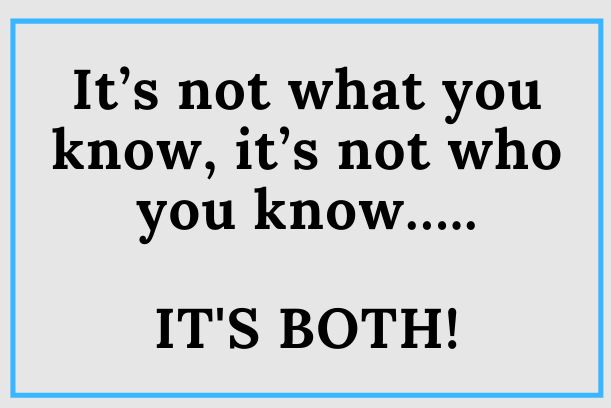 How To Connect With Others
How To Connect With Others
Using your imagination, what would your team and your organisation look like with a lot more highly effective leaders? Imagine the low performing leaders changing their attitude, and making the decision to work on themselves with your help.
Imagine how you could help your leader, and the other leaders too. What could you do to help and support them? How could you help them to turn their teams into highly effective leaders?
You have a new wealth of knowledge through this website, and my articles. Imagine the difference you could make in your organisation, and your industry with that knowledge.
Thinking about your own team first, who on your team are highly effective leaders? Who on your team are low performing leaders (if any)?
When you go back to your team, what are going to discuss with them? What action will you take to help improve your team, both as a whole and as individuals? How are you going to make your organisation a great place to work? How can you help your organisation bring in new and better talent?
How can you help your organisation retain the highly effective leaders? How are you going to feel when you go back to work and you are with your team? How are they going to feel? How can you help your teammates to start feeling better about themselves, and their place of work?
These are all very direct questions, and you don’t have to answer them all at once. But they are definitely questions that you should think about while you are reading the rest of this article. You should also think about how to answer these questions when sharing the ideas from this article and my other articles with your teammates.
Everybody can improve, not least the low performing leaders that we have on our own teams, and who are on other teams within our organisations. However, for us to continuously improve, we must work on ourselves every day, and to do that, we must have the right attitude.
As we have discussed on many occasions, a low performing leader’s attitude to change or improvement is wrong. So, when sharing these new actions from this article with low performing leaders, we need to work on helping them change their attitude first. We do that by making a connection with them.
To make a connection, we must first show our low performing leaders the way by leading by example. We must commit to not only learning the actions that are in my articles, but by deliberately choosing to implement them for ourselves first.

We need to prove that these actions work, and when doing so, we will start to see attitudes changing.
Our influence will increase with our teammates, and the relationships that we have will become stronger. With increasing our influence with the low performing leaders, we will start to build trust and relationships with them too. Things will start to feel better within our own teams, and throughout the organisation.
Making the choice to lead by example is one that we must make when we want to implement what we are learning in this article. We cannot let others make any choices for us, and we cannot let what we are learning go to waste by doing nothing.
So, let’s make the commitment to action implementation today, for ourselves, for our teams, and for our organisation. Let’s choose to be the leader. It’s up to you.
The first time I made the choice to take action with my team, and help them to work towards becoming highly effective leaders was when I first moved to London. I worked as an engineering performance manager for Siemens, and I was part of a team based at a west London train depot.
One of the team was a technical engineer called Phil. He was a really good engineer. However, he wasn’t a leader, and wasn’t very approachable when it came to teamwork, or other team based activities. At the time I considered him a low performer because of his lack of consideration for the team.
All he really cared about was getting his work done, making sure the trains were working well, and then going home at the end of the day. He made sure the bosses knew what he did, but not what the team did.
There was one occasion in 2015 when I had just employed a new technical engineer to join Phil as part of the engineering performance team. His name was Freddie, and I wanted him to work closely with Phil at the beginning for two reasons.
The first reason was to try and bring Phil out of his shell, and embrace that he was part of a team, and his job was to help his teammates. The second was to see if Freddie could learn anything from Phil, as he was a really good engineer. Neither reason worked.
Freddie came back to me and told me that Phil was not working well or co-operating with him at all. Freddie asked Phil, “How have you managed to keep the trains performing so well for so long?”
Phil’s reply was, “I’m sorry Freddie you will have to find out for yourself. I am not willing to give away my own secrets on how I do my job well. Nobody helped me, so I am not going to help you.” He was not an approachable person whatsoever, and he was making life difficult for everybody.
Phil was not connecting with anyone, including me, so I needed to take action. I sat Phil down for a one to one, and I asked him the question, “Would you consider yourself a leader?” He replied, “Yes.” I asked, “How?” He said, “Because I am the one who is keeping our trains performing, nobody else.” I couldn’t believe what I was hearing.
I continued, “So, how is the fact that you claim to keep the trains performing, and nobody else, a part of teamwork? What was the team’s contribution?” He couldn’t answer that question. He continued to tell me what he had done, and was doing to keep the trains running.

Phil’s problem wasn’t that he was an ignorant person, or had a bad attitude. It was the way he had been brought up throughout his career. He was taught that it was every man/woman for themselves. From his previous places of work, teamwork was not really promoted or supported.
So, I decided that the action I would take was to teach my own team about what a team is, does, and how we can make things better by being a team. This was my opportunity to lead by example with my team, and hopefully the rest of the department.
We spent two days in the classroom, and I taught my team “what is a team?” “How can we be a team?” “What my expectations of our team are.” Then finally, for the team to come back to me on how we were going to achieve my expectations.
All I did was listen, I left it up to the team to work out how they would gel as a team, and how they can achieve the desired results.
Listening to the team speak to each other, and to me with such passion on how they were going to achieve my expectations was the most enjoyable part of the two days. I knew it was going to work because of the vigor in each person’s voice, and the passion for the team was amazing.
They connected with each other, and with me. I had taught them how to be a team, and they were now implementing what they had learned. Over the next weeks and months, Phil had a transformation like none I had ever seen. He was becoming a highly effective leader.
He was openly sharing his ideas, his knowledge, and even helped apprentices and graduates when they visited the depot. I was and I still am extremely proud of Phil, as he still works in the same team and is helping the Siemens organisation every day.
To connect with others, you must build relationships with them, and to do that you must share with them. That is how you build trust. When you connect, you increase your influence. First within your own team. Then multiply your influence with your department, your organisation, and your industry by continuing to connect with others.
How are you going to implement what you have learned so far in this article, and what you will learn through my other articles?
How are you going to help the other members of your team, to work towards becoming a highly effective leader? How are you going to help the other teams within your department, and within your organisation?
I welcome hearing how this post has influenced the way you think, the way you lead, or the results you have achieved because of what you’ve learned in it. Please feel free to share your thoughts with me by commenting below.
All the best,
Tags: Culture, Leadership, Transformation
 How Do You Get Results?
How Do You Get Results?
As a manager, when you want to know what’s happening, do you go straight to your team and ask questions? Or, do you speak to middle men? A highly effective leader goes straight to their team who are doing the work, and asks questions.
They do this so they can find out for themselves. They like to be visible to their team, and show that they care. By doing this, they continue to build trust with their team. because they are not stuck in the office talking to a deputy.
Highly effective leaders take the full responsibility for the team to achieve great results. They are not happy with speculating or assuming that things are happening. They need the facts, and the only place to find out the real facts is by going to the team, engaging, and asking questions.
They may even get stuck in, and get their hands dirty. When I was an engineering production manager, I would love to do that, and mix in a little bit (not too much).
I believed that it showed the team I was willing to be there with them, and that I cared. I wasn’t one for sitting at my desk, and reading through mountains of reports all day. Or, looking through the systems on my laptop.
A highly effective leader is one who gets results. A low performing leader is one who plans to get results. That is why you will never see a low performing leader walking around. They are never visible to their team, and they don’t show that they care.
They would rather look through reports all day. Why do you think they would rather look at reports, than engage with their team? If the report is wrong, then they have an excuse for not achieving the desired results. It is also really easy to just sit behind the desk and pretend you’re busy reading.
I want to discuss a story that will outline the difference between planning to get results (managing), and actually getting results (leading).
When I worked with the Liverpool train operating company, the first depot manager I worked with led his teams by report only. He would rather hold meetings with his immediate team of engineering supervisors in a conference room, than going down to the shop floor, and talking to the engineers.
He would demand that they all put a report together of what the issues were, and why the depot and the trains are not performing well. I had to attend some of these meetings, because it was me who had to put most of the reports together.

He asked me to come because if the reports were wrong then he could blame me, and he then had his excuse. For the engineering supervisors and himself, these meetings were a complete waste of their time.
They should have been spending their time walking around the shop floor, and speaking to the engineers who were in the trenches. The engineers had all the answers as to why things weren’t going so well.
The depot manager was not my line manager, but he did have an influence. His teams and our team had to work very close together. At the end of these meetings, there would be a long list of actions for everyone that needed to be completed by the next meeting.
In reality, nobody would do their actions because they were not inspired to, and we didn’t think they were necessary. So, when the next meetings came around, they just talked about the exact same thing as they did the previously. It was quite funny to watch.
Luckily for everyone, he was replaced by someone who was a highly effective leader. The very first day I met him, I could tell there was something different about him. He had a presence that the previous depot manager didn’t have.
He talked to everyone, he went around the shop floors to talk to the engineers, and find out what was happening. He even came in on nightshifts to talk to the engineers so that he didn’t miss anybody.
He accepted responsibility for the results of the depot, and wanted them to improve. He didn’t want to plan to get results, he wanted to actually get them.
He made sure that everyone had the right equipment, and had the right safety equipment. If anything was old, he would authorise for it to be replaced with new. He even authorised for the offices to be upgraded, and painted because he thought they looked a bit old.
This was all in his first month. He wasn’t one for reading lots of reports, so you would see him often walking around with his engineering supervisors. They were talking to the engineers, and understanding the issues.
He came into our office one morning and asked me to come for a walk with him around the depot. He told me he wanted to get to know me a bit more, and about my background. The previous depot manager just about knew my name.
While we were walking around we stopped to talk to one of the engineers, to see how he was doing. He told us that he was working on a fault with the underframe of the train.
So the depot manager and I got safety glasses and hats, and walked under the train to see what was happening. For the other engineers to see us under the train was great, it showed them that he cared.
This was one of the first times I learned about how important it was to listen when you are the leader. When we reached the engineer under the train, he allowed him to tell us what the issue was first. Then the depot manager would ask open questions of how he was going to resolve the issue.

He didn’t tell him how to do it or what to do, he allowed him to think about it himself. He made it extremely comfortable for the engineer to talk to him.
I remember thinking at the time, he has an amazing skill to get people to think for themselves, and come up with their own solutions. I really liked this new highly effective leader, and still keep in touch with him today.
He was the depot manager who would listen to me, and ask me questions. The questions he asked, helped me to come up with solutions that were required to improve our trains’ performance. Especially when the wheels on the trains were not lasting their full life of six years.
He asked me to “think outside the box” and work out a solution for making the wheels last longer. I loved that about him, he empowered us to go away and think about the problems we had. I would brainstorm with my teammates (teamwork), and then come back with our solutions.
When I had my solution to how we were going to increase the wheel life on the trains, he invited me into his office to discuss it. He would get out his whiteboard, a marker pen, and write down all the ideas I had. Then one by one would ask me thought provoking questions about them.
This made me think deeper, to see if there was anything I missed. Half the time I did, but that was because I wasn’t thinking deeper enough. It was an excellent technique he used, and was one I used with the teams I led, everywhere I went.
Then, when we finished he empowered me to implement the solution and fix the problem. He didn’t once “tell me” what to do. When I did implement the solution, the wheel life increased, and it was successful.
The feeling I got from doing that, and how we worked it out together was amazing, I wanted that feeling every day. He was a highly effective leader and got results. His predecessor was an insecure leader and planned to get results.
Highly effective leaders want to fix problems. Low performing leaders want to discuss problems. As a manager, you can either be part of the problem by discussing it, or you can be part of the solution by helping your team fix the problem. It’s your choice.
I welcome hearing how this post has influenced the way you think, the way you lead, or the results you have achieved because of what you’ve learned in it. Please feel free to share your thoughts with me by commenting below.
All the best,
Tags: Culture, Leadership, Transformation
 Embrace Your Team's Potential
Embrace Your Team's Potential
Before you embrace your team’s potential, you must first embrace your own potential. As a leader of a team, we all want our people (or we should all want our people) to be the best they can be, and go the extra mile for us and the team.
However, if we are expecting this of our team, then we should be expecting the same from ourselves and leading by example.
What we need to realise is, we are in exactly the right place we should be at this moment in time. The reason we are in exactly the right place we should be is because of us, nobody else. You are the reason you are where you are.
I am the reason I am where I am. If you want to change your current circumstances then you must first start with yourself. If you feel that the results you are getting should be better, then you need to better yourself. Nobody else can do it for you.
How is your team performing at present? If they are under performing, then you are not leading them right. A highly effective leader serves his/her team, and a low performing leader actually believes it should be them to be served.
If you are not currently serving your team, and they are under performing, then you need to change your leadership style to one of service to your team.
When I ask you to “serve your team”, what I really mean is help your team. When I have used the term serve in the past, a lot of people I worked with didn’t like the term. So I stopped using it and just used the term help. Help and serve both mean the same thing.
To lead a team, what you are really doing is helping them. What you are helping them to do is to perform to their best, be the best person they can be, and complete their work to the best of their ability.
It should be your purpose to influence every member of your team, so that they can increase their influence with each other, and others within the organisation.
Highly effective leaders know that leadership is influence, and that everybody within their team has influence, so therefore everybody has the potential to be a leader. You just need to embrace that leadership potential you have in every member of your team.

You have a team of leaders already, they just lead on a lower level to you.
You lead on a different level to your own senior leaders. Followers only follow leaders who are on a higher leadership level to what they are.
For example, your senior leaders will not see you as their leader, and usually won’t follow you, so you will not be able to develop their leadership skills. However, that does not mean that you cannot influence them.
Who you are (character) is what determines what level you are in your leadership. What you know (competency) plays a part too, but a much smaller part.
For example, when you interview a person to join your team, you are a lot more likely to hire them because of who they are, not what they know. I have hired people who were not as qualified as some of the other candidates, but they knew who they were and I had that feeling.
We have spoken previously that leadership is 80% character and 20% competency. If there is a member of your team that you cannot connect with, then what and how much they know is irrelevant.
You are much more likely to achieve great results with your team, if you can build a meaningful relationship with them. If there is no trust between you and your team, then they will not give everything they have, and be the best they can be.
For you and your team to achieve the best results possible, you must focus on strengthening your own character, and building strong relationships with each member of your team. Both as individuals, and together as a team.
Creating a relationship of trust is what’s most important. With trust you will find it much easier to gain buy-in, and the team will want to do their best, and be their best for you and everyone on the team.
As a highly effective leader, it should be your mission to embrace your team’s potential, and this means developing them as leaders. When you have built strong relationships, and the team are performing well in their day-today tasks, then you must now go that extra mile for them.
Moving beyond the job position and title and developing the team into leaders is how you continue to build those strong relationships.
Your team will follow you because they want to. They will feel the importance of working on and developing their leadership. They will understand how to influence others as they are becoming highly effective leaders, just like you.

Teaching and developing your team in their leadership is what will be remembered. When doing this you are positioning you and the team to be the most successful you can be. When you are in this position, you have the potential to achieve the best results you can.
We discussed leadership levels in a different article. As you are developing your team into leaders, your leadership level will also be raising higher. As you and your team’s leadership levels increase, your results will continue to improve. So the answer to the question, “How do we keep improving our results?” is, raise your leadership level.
As you are going through my articles, and putting into practice what you are learning, you are automatically raising your leadership level. As you teach your people what you are learning from my articles, your team’s leadership level will be raising, as will yours even more.
So, think to yourself and discuss with your team, what results do we want to see? Do we want to have good results, great results, or amazing results?
You know what you need to do, just keep raising your own leadership level, and help your team to raise their leadership level too. Highly effective leaders strive to achieve amazing results with their teams.
To achieve the best results possible, you need to go further than what is required. You and the team need to go the extra mile for each other, and for the organisation.
But first, you need to become the best leader you can be, and your team need to become the best leaders they can be. As long as you keep working to your best, you will achieve the best results possible.
However, for you to have a team of leaders, who are the best people they can be, you need to keep investing in them and developing them. As I said earlier, they will feel your investment, and they will feel different when they are being developed.
It is the feeling that will be remembered, not just the fact that you have invested in them. It is this feeling that the team will want more of, and that you will also want more of. So, to keep getting that feeling, keep developing.
I welcome hearing how this post has influenced the way you think, the way you lead, or the results you have achieved because of what you’ve learned in it. Please feel free to share your thoughts with me by commenting below.
All the best,
Tags: Culture, Leadership, Transformation
 Leadership Requires Character
Leadership Requires Character
To be an engineer for example, you need to have certain qualifications, and regularly be assessed against engineering competencies so that you are still deemed safe and competent to work. However, what an engineer or any other role in any other industry is not assessed on is our character. Leadership is about CHARACTER!
When going through our competency assessments or exams so that we gain the qualifications to be whatever it is we are working towards, it is all provided for us. We also have the help we need to be successful in that area. That is not our responsibility to provide.
But, what we do have full responsibility for is our motivation, drive, positive thoughts, inspiration and determination to pass the exams and complete the assessments.
I don’t know many people throughout my career of 21 years who have ever been fired, I am one of those people. There have been times early on in my career when I probably should have been fired, but I was let off and given another chance on a couple of occasions.
When you think about it, can you imagine being hired for a job by a person or company, and then later be fired by the same person or company? One minute you are on such a high from getting a new job, and the next minute you are on such a low from losing it.
Let’s discuss why people get fired from jobs, but also let’s discuss why they get hired in the first place.
Whenever I have hired anyone in my previous roles, it was to do a job. I wanted to know “what” they knew, or what competencies they had. This is usually why people are hired, but there is so much more than just knowing what to do when hiring someone.
The criteria that is usually considered when hiring someone one is:
If the person can match the above, then that is when they are usually hired.
Then, when they are hired and they have been in the job for a good while, they either assure their leader that they can do the job or they can’t. It’s very rare that the people we hire cannot do the job.

However, what we also find out about the person we have hired is their character or who they are. We learn this by how they act, who they associate with and what decisions they have made.
Sometimes after a while in the job, we may find that the person we hired would be better suited in a different role, but that is not firing or demoting. It is more of just a side step in their career. This happened to me a few times, and it worked out for the best.
So, the reason for the side step is not an issue with what they know, it is more of what they don’t know. Obviously, they can learn what they don’t know but depending on the size of the team and the job, it can be better to move them into a different role.
So, as I stated, the problem isn’t with what the person knows. When it comes to firing someone, the problem is something else; CHARACTER!
When it comes to getting fired, it’s not “what we know”, it’s not “who we know”, it’s “WHO WE ARE”. 9 times out of 10, our character is what gets us fired.
In my career, I have had to fire 3 people. The reasons I had to fire these people are as follows:
As a team, the meetings that we usually go to are to be informed or advised about what’s happening. But, I would always encourage my teams to bring their ideas, and I would listen. I would listen to understand, not to reply and talk over them.
So, from the reasons above of why I fired my 3 people, what can you do to ensure you don’t behave like them? What can you do to ensure that you remain on the right direction on your journey? What can you do to ensure you are striving towards a successful career and life?
You must learn and implement what I am sharing with you, and continue learning from other great leaders.
Leadership is not a noun, it is a verb. Leadership is action, it is moving, so you cannot stand still when it comes to your leadership. Your influence is either increasing or decreasing, it is never still. The only way to ensure your influence is increasing depends on your character and every decision you make, every day.
I’ve never worked with a company who train their teams on leadership development, or character development. When it comes to the people, the only training they have ever gotten is competency based training so they can do their job a bit better.

To me, that is not good enough. The team members need leadership development just as much as any supervisor or manager.
This has been the norm for years, so it doesn’t mean that the company you are working with is a bad company, or they have bad leaders.
Hopefully, the company you’re working with has provided you with leadership books or personal growth books. If that is the case then they do care about developing your character and your leadership. If you thank your leader for providing you with these books then that will definitely increase your influence.
On the other hand, help your company if they did not give you these kinds of books, or they don’t provide leadership development for their team members.
By sharing leadership and personal growth books, you will be recognised by your team, your boss, their boss, and even their boss as a leader. Share the principles you have learned from this article and my other articles, and help the people who don’t understand.
This will increase you influence tenfold, and the company may even follow your lead to bring in leadership development for the people and beyond.
If your company eventually invests in leadership development and character development for their people, then they will attract the best leaders and people all the time.
I welcome hearing how this post has influenced the way you think, the way you lead, or the results you have achieved because of what you’ve learned in it. Please feel free to share your thoughts with me by commenting below.
All the best,
Tags: Culture, Leadership, Transformation
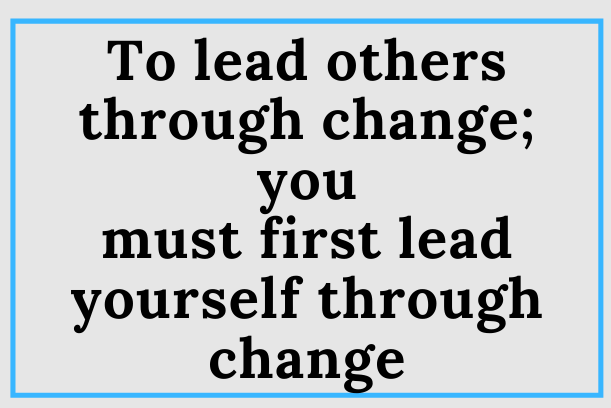 How To Lead Yourself Through Change
How To Lead Yourself Through Change
When you push people through change, it is a poor experience. Highly effective leaders treat change as an experience. They lead from the front, buy-in to the change first, and then lead their people through that change.
Over your career, and your time leading a team, would you say you have developed yourself to become a better leader? Have you developed yourself in the area of leadership and how to lead people (character)? Or, have you developed yourself in the area of management and how to manage people, processes and things (competency)?
Be honest with yourself when answering these questions. You are well aware now that we can only lead people, we cannot manage people.
The reason that most people in leadership positions prefer to manage people rather than lead people is because, management is easy, and leadership is difficult.
To lead others and to help them grow, you must first lead yourself, and work on yourself every day so that you grow. Be honest with yourself. Do you lead yourself, and work on yourself every day?
Have you accepted the responsibility to help develop each individual on your team in the area of leadership (character)? Do you take the easy way out and manage your people instead of lead them? Do you only develop them so they are able to do the job (competency)?
If you want to strive towards becoming a highly effective leader, then you need to embrace a new way of thinking. You must help yourself and your team to experience a new kind of change. By embracing a new way of thinking, it will be your role to help your people to embrace a new way of thinking too.
You must constantly be developing yours and your team’s minds. As you work on developing minds, you are freeing up space in the mind to also develop new, or continuously improving old processes. Experience a dramatic change in your team, and keep going.
From now on, if you want to implement a new idea, change, or process, you will need your team to buy-in to you and the idea, change, or process, and what the benefits are. To get your team’s buy-in, you need to inspire them and motivate them.
If you have been managing your team rather than leading them this is going to be a lot more difficult. You need to change your way of thinking first. You must lead yourself, and motivate yourself before you can motivate your team.

We have discussed how difficult it is to get a team to buy-in to a new change. As you are aware, most teams will resist new change because they are not bought in, and do not want to change. So make it as easy as possible for yourself. Only when you have bought-in to yourself and the new change, can you lead your team to do the same.
With me writing this article, my other articles, and creating my other materials, I am trying my best to inspire you and motivate you to buy-in to me. As you are reading this article, it is my role to help you release the potential you have to become a highly effective leader.
I want to set you down the right path on your journey to becoming a highly effective leader. When you release this potential, you can then help your people to do exactly the same as you, and set them on their journey to becoming highly effective leaders.
At this moment in time, does your team follow you because they want to (leadership), or do they follow you because they have to (management)? Again, be honest with yourself. If you want your team to buy-in to your idea, change, and your vision, then they must first buy-in to you.
If they buy-in to you first, then they are following you because they want to, and you are on the right path to actually becoming their leader. If they do not buy-in to you, then you unfortunately are not their leader. You are just someone who is filling the leadership vacancy.
It took me a number of years while being in my first couple of leadership positions to figure out why some of the changes I wanted to implement, did not work…They did not buy-in to me first.
I wasn’t working on myself every day, so I wasn’t leading myself first, and I wasn’t really buying-in to the change first. It felt almost like bringing in change, just so I could say I brought in change.
After I had spoken with my mentor, and he helped me to realise that I needed to get the team to buy-in to me first, I knew exactly what to do. I needed to change the environment. I needed to create an environment that encouraged continuous improvement for ourselves, not just our processes.
I needed to lead by example by working on myself, and then helping my team to work on themselves and develop. Only when I did that would the team buy-in to me, and eventually I could lead them through the change.
With this website and my articles, I am creating an environment to help you continuously improve yourself. I am not creating an environment to help you continuously improve your processes. Continuously improving yourself is a part of your personal growth, and is a personal growth principle.
When we focus on continuously improving our processes, we are expecting to improve our results. Now, we need to change how we think of continuously improving ourselves. We need to get comfortable, and believe in the process that when we continuously improve ourselves, we can also expect to improve our results.
A highly effective leader’s mission is to inspire their team, and motivate them to continuously improve. Make it your mission to do the same.
Low performing leaders focus solely on the results. They do not focus on the people at all, unless they want them to do a certain task. So they will arrange for them to learn the new task, but will not help their people to develop their character and leadership.
Low performing leaders don’t even focus on developing their own character and leadership either. All they are interested in is using their people to make themselves look good to the leaders of the organisation. I know this because I have been manipulated many times.

It is a horrible feeling when you know you are being manipulated. That’s how you can tell it is a manipulation because it is a feeling that you have that something isn’t right. But, I didn’t say or do anything about it because I didn’t want to upset my boss, or “rock the boat” in any way.
So, I just got on with it and let myself be manipulated. However, after a while I needed to snap out of it and think differently. I needed to believe in myself a lot more. I needed to lead myself better.
I needed to work on myself so I wouldn’t be manipulated again. I needed to become a highly effective leader, and have respect for myself and my people.
Highly effective leaders lead their people through their strong character, and they have integrity. No matter what kind of environment they are working in, they truly stand up for what they believe in. They will never let themselves, or their team be manipulated.
They will never manipulate anyone else either. Even if the senior leaders of the organisation are low performing leaders, a highly effective leader will not allow any kind of manipulation happen.
Most of the organisations I have worked with have had traditional leadership team setups. Their senior leaders focus on the results, not their people. The senior leaders do not have respect for their people because they don’t develop their people.
I tried my best to ensure that the team I led did have those opportunities to develop, and did not follow the norm. I know this because I respected my people, and we worked on ourselves, and developed ourselves every day.
When I lead a team, I do my best to make sure that they feel that I respect them. I do not want them to feel that I am being fake. When I know that my team feels that I respect them, I can also feel that they respect me.
When respect goes both ways, that is when I find it easy to help them develop themselves, and we can achieve great results together. Respect both ways is what highly effective leaders focus on and count on.
I welcome hearing how this post has influenced the way you think, the way you lead, or the results you have achieved because of what you’ve learned in it. Please feel free to share your thoughts with me by commenting below.
All the best,
Tags: Culture, Leadership, Transformation
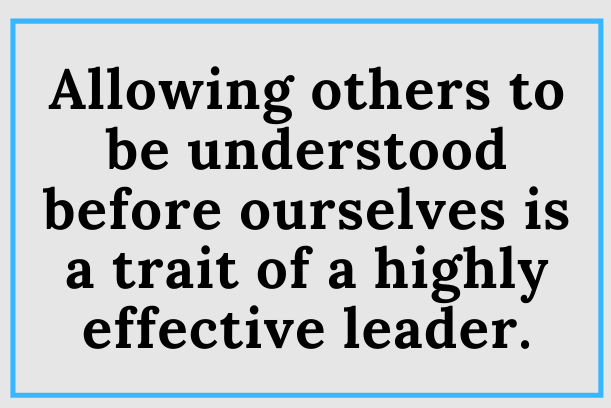 How To Understand Your People
How To Understand Your People
A lot of people throughout the world do not know what it actually means to understand a person. I was one of these people for a very long time in my life. I didn’t know how to really listen to a person, and I didn’t know how to have empathy with a person.
I thought that to empathise with someone meant that you have to sympathise with them, but there is a difference. To sympathise with a person is when you have the same feelings as them, and you share them.
To empathise with a person means that you don’t have to share the same feelings as them, but you do understand the feelings of that person.
Having a discussion with a teammate and either agreeing or disagreeing with them is not the same as understanding them. A highly effective leader will always try to understand their teammate first before giving any opinion, feedback, disagreement, or agreement.
However, there are team members who will think that when someone is understanding them, that they are actually agreeing with them.
This is a mistake, so it’s very important that when you want to understand one of your teammates first, ensure to let them know that first. Otherwise there will be a misunderstanding on your teammate’s part.
A highly effective leader not only wants to communicate with his/her team, they want to connect with them. How does a highly effective leader do this? Firstly, they state very clearly to the teammate they want to talk about what their intentions are.
They may say something along the lines of, “I want to understand how you visualise things, and why you visualise them in the way that you do. I am not going to give my opinion on the matter, nor am I going to agree or disagree.” This sets the foundation for the communication.
Then to connect with the teammate, they will listen more than they speak. They will use their ears a lot more than their mouth, and let the teammate do the talking. It’s important that when you are listening, you understand the meaning of what the teammate is saying.
I talk a lot about influence, and how as highly effective leaders and leaders that to increase our influence with others is how we lead. However, in the case of trying to understand our teammates, and connecting with them, we must allow ourselves to be influenced first.

By understanding the teammate first before they have the opportunity to understand you, it is like you are passing the baton of influence onto them. They have taken the reigns of leader in this communication.
What you are basically communicating through your actions of understanding is, “I am patient, and I want you to be understood first before you understand me. You are important to me.” It doesn’t seem like a lot, but doing this can be very powerful in communicating and connecting with your teammates.
By passing the baton of influence, by the time you receive the baton back, your influence will have increased a lot more than you expected.
If you were to do the opposite, and try to get your teammate to understand you first, then they will not listen to you. They will probably not be aware or know how to really understand someone, as you now do.
So, because they think you don’t understand them, they will try to talk over you to help you understand them and the communication will ultimately breakdown. They will use their mouth a lot more than they will use their ears.
But, if you do what we discussed above, and understand the teammate first, then they are a lot more prepared mentally to listen to you. They will want to understand you, and by doing this they are passing the baton of influence back to you.
Your teammate will want you to influence them, and are happy to be influenced by understanding you.
When a highly effective leader communicates and talks to their team, they want to be understood by them. If they are talking to someone who is not listening to them, then that is a complete waste of their time, so they will stop the conversation.
When listening to their teammates so that they can understand, they reassure their teammate that they are listening.
They do this by saying things like, “I can sense that this is a very emotional subject for you. Or, “I can tell that you are excited and want to talk about it a lot more.” Or, “If you would rather talk about this another time, I am always available to listen.”
Other ways that a highly effective leader assures their teammates that they understand is by repeating what their teammate said. If there is more people involved in the conversation, then by repeating and rephrasing what the teammate said will allow the other team members understand too.
This is a good trait to have, and it is very effective when the conversation is emotionally charged, or the topic is very important to the team.
A highly effective leader may say things like, “Can I just repeat what you said then…” Or, “I think I understand you correctly, is what you mean…” Or, “I hear what you’re saying, is this how you’re feeling about it…”
A low performing leader will want to be understood first, so will put all of their energy into talking more than listening. Most of the time, they are misunderstood because what they’re saying is mostly negative. People switch off when listening to negativity, unless both people are negative.

The negative team members who I have worked with in the past, every single one of them were the same. If what they were saying wasn’t understood, or nobody was listening, they would all do the same thing.
They would become very frustrated, so their voices would get louder, and louder. Some of them would become very animated and kick things or push things over.
It’s interesting to listen to a low performing leader talking to another low performing leader. They are both looking to be understood first, so they are both talking at each other.
They are not talking to each other. In the end, nobody is understood and the communication breaks down. In the end, it is up to us when we talk, but it is up to others on whether they listen to you or not.
Being part of a team, whether it is an engineering team or in any other industry, for it to work then we must understand each other. As a highly effective leader, we must allow others to be understood before ourselves.
If the communication is between 3, 4, or 5 people, then we must still allow everyone else to be understood before ourselves. That is what passing the baton of influence is, and what it means to connect with your teammates.
What we must also do as part of a group communication is to step in from time to time. If a person is speaking to allow others to understand them, then as a highly effective leader, we must allow the person to be heard.
If someone talks over the person, then we must step in and tell that person to wait their turn to speak. It is not being rude on our part, it is being courteous towards our teammate.
Understanding our teammates first, and allowing them to speak is a trait of a highly effective leader. But, what about understanding ourselves? Before we understand others, we must first understand ourselves.
To do this we must continue working on ourselves every day. When working on ourselves we will understand our own strengths, weaknesses, likes, dislikes, and our capabilities.
Highly effective leaders work on themselves every day to understand themselves. I urge you to do the same.
I welcome hearing how this post has influenced the way you think, the way you lead, or the results you have achieved because of what you’ve learned in it. Please feel free to share your thoughts with me by commenting below.
All the best,
Tags: Culture, Leadership, Transformation
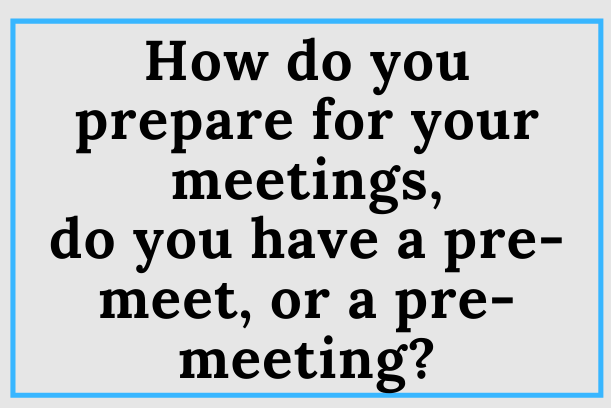 How Do You Prepare As A Leader?
How Do You Prepare As A Leader?
When you arrange meetings with people, either your team, other colleagues, or the senior leaders, how do you prepare? For years when I was in a leadership position, I would mostly just prepare on my own. Or, I would discuss a certain issue with a team member, then I would go and have the meeting.
But, when I was doing that, I was never, ever satisfied with how my meetings went. There was always something that happened that I felt made the meeting unsuccessful, and I couldn’t put my finger on what it was.
The result of these unsuccessful meetings was, the actions taken from the meeting were either not completed, or were completed to not a very good level.
Then, one day, I was running really late (because I had not prepared well), and I turned up to my meeting totally unprepared. As you can imagine, the meeting did not go well at all. However, I could finally put my finger on why my meetings were not going very well….ME.
I was the reason. My preparation was nowhere near good enough. So, I decided that I would start to have a meeting before the actual meeting. People call it a pre-meet, but to me that is just a catch up, not a meeting. I needed to have an actual meeting before my actual meeting.
So I called mine a pre-meeting, not a pre-meet. This would take up a lot more time and effort on mine, and the team’s behalf but it was worth it. When I started to do this, others followed in my example too, and our meetings were far more successful.
The pre-meeting was especially important if I was trying to gain buy-in from my team or from others during the actual meeting. Having the pre-meeting allowed me to prepare how I was going to get buy-in, and how I was going to increase my influence.
So the influence and buy-in seeds were planted in the pre-meeting, and I could start to gain momentum then, instead of during the actual meeting which would be too late. I needed to build on my momentum from my pre-meeting, not try to begin the momentum during the actual meeting.
This principle is something I definitely want to you to consider doing because it can make you actual meetings become more successful.
When having your pre-meetings, always think of a win-win situation for all. The pre-meeting, or indeed the actual meeting is not only so you can have a successful meeting. It is for everyone involved to have a successful meeting.

If you have this mindset during your pre-meeting, then the actual meeting will be a lot easier for you to gain buy-in and increase your influence.
If you do not have your pre-meetings, and do not have a win-win mindset, then your meetings will be just as difficult. They will become a lot more difficult too as you progress in your career.
Having the pre-meeting, and keeping a win-win mindset is another way for you to connect with your people. You are going beyond communicating to connecting because you are willing to put the extra time and effort in with your team to prepare for the actual meeting.
The team will feel this effort from you, and your relationships with each team member will grow stronger. Finding the time to have your pre-meetings is something you will have to plan for, and make time for. Do not say to yourself, “I don’t have the time.” Or, “Where am I going to find the time?”
This will create a negative mindset for yourself, and you will put the pre-meetings off, which will decrease your influence, ruin your preparation, and buy-in will become a lot more difficult.
Most leaders (in fact most people) from all over the world invite people to their meetings from an Email request that goes straight into their diary. A lot of the time, people don’t understand what the meeting is about, or why they have been invited.
But, the meeting request is from their boss, so they have to accept and turn up. What happens then is, the meeting begins, nobody has a clue why they’re there, or what to contribute.
The leader does most of the talking, assigns actions to people, and then everyone walks out. However, when people walk out, they feel uninspired, they feel de-motivated, and most of all they feel disrespected.
I understand that leaders are busy, and that everyone else is busy too. But as I said earlier, pre-meetings, and meetings need to be planned for.
We need to find the time for these meetings to make them successful. When we do this, we are showing our people that we respect them. When we don’t we are not showing respect because we are not willing to put in that extra time and effort to help them.
An example of this was when I started to organise my first team meetings. I thought it would be good to have a team meeting so we could discuss issues and see if we could help each other. So, the intention was right, but how I went about it was wrong. Very wrong.
I told my team that we would be having a team meeting…by email. So nobody replied to ask why, or what we would be talking about because I hadn’t spoken to them face to face about it. My email was very vague, and gave just a few details.
I didn’t have an agenda, or any bullet points of topics to discuss. I thought it would be good for all of us to open up. However, as you well now know, if you want a team member to open up, you must build trust, build a relationship, and connect. You cannot do it in a meeting with the whole team.

Anyway, the meeting time came around and I was totally unprepared. How I could have thought I could make this meeting successful without an agenda, topics, or even telling the team a reason is beyond me now.
So, I began the meeting, and I told them why I wanted to call it. I said, “I thought this would be a good chance for us to get to know each other better.” Everybody looked at me blankly, and gave me the impression that they didn’t want to be there at all. Some even laughed at me.
One of the team members said, “Tom, I understand that you want us to get to know each other better, but you could have done it a lot better than this couldn’t you? You haven’t spoken to us, you haven’t told us why you wanted us here, and you haven’t given us anything really to talk about.”
He was right. I was basically “winging it” and the team felt that. They felt disrespected. I didn’t have a pre-meeting with them, and I didn’t connect with them beforehand. I didn’t have a win-win mindset for all. So, I called the meeting off. This was the meeting when I put my finger on why my meetings were unsuccessful.
I turned it around following this meeting because of my pre-meetings.
Highly effective leaders understand the importance of putting in extra effort and investing more time with their people to have a pre-meeting, and then an actual meeting. Highly effective leaders know that this is the only way to make it easier to get buy-in, build trust, and increase their influence.
Highly effective leaders do not send out email meeting requests and then don’t tell anyone what the meeting is about, or why they are invited. Highly effective leaders know that by doing that, it is massively putting themselves in danger of being un-prepared. Highly effective leaders know that by doing that, they are creating distrust.
Highly effective leaders know that by doing that, they are decreasing their influence, and their ability to get buy-n. But, most of all, highly effective leaders know that by doing that, they are disrespecting their people.
Highly effective leaders make it a priority to have a pre-meeting. They deliberately want to keep building on their already strong relationships, and make it even easier for themselves to get buy-in. During the pre-meeting they will set the vision, ask the team open questions, and most of all they will listen 80% of the time.
The pre-meeting adds to the culture and environment of the team and the organisation. It gives people a warm feeling that their leaders are willing to put the extra time and effort in to help them and the organisation to move forward.
I welcome hearing how this post has influenced the way you think, the way you lead, or the results you have achieved because of what you’ve learned in it. Please feel free to share your thoughts with me by commenting below.
All the best,
Tags: Culture, Leadership, Transformation
 How And Who Will You Leverage?
How And Who Will You Leverage?
To leverage your team, you need to share your knowledge. In all industries throughout the world, you will always come across people who don’t like to share their knowledge. They are known as “knowledge hoarders” and they make life in the office, depot or work site very difficult for others.
They send a negative message through their team and throughout the organisation. Life can be extremely difficult at work for people who want to learn and grow, as they cannot get access to the knowledge they need to develop themselves. I have come across many people like this throughout my career, and I’m pretty sure you have too.
People who hoard their knowledge do so for 3 reasons:
In my experience, I have worked with people from the second and third categories. The industry of engineering where I come from is full of data snobs. They thrive on having far more data than they need. It’s funny, because these data snobs are usually the people who are paranoid and frightened to give their data or knowledge away.
They want to be seen as specialists by their peers and their leaders. They think that having more data, and information makes them the most valuable assets on the team. However, with highly effective leaders it is the exact opposite that is true.
If a highly effective leader learns something new, they are more than happy to share what they have learned with their team. They do this because it makes themselves and the team more valuable. They are putting the team first, as they can do a lot more with the information than the leader could.
Highly effective leaders know that the more the team knows, the more the team grows. They are deliberate with sharing knowledge, and teaching others to do what they can do.
The reason highly effective leaders share their knowledge is so that the team can perform to their best. The leader wants the team to be at their best at all times, whether the leader is absent or at work. There should be no difference in productivity or attitude of the team, because they are a highly effective team.
Only a secure leader is happy to share their knowledge, as they do not see anyone else as a threat. They only see them as an asset. So, if they share their knowledge, they are improving the asset by developing the team.

Insecure leaders are unhappy to share their knowledge, as they think it will make them weaker. So, with that in mind, the more they know the better it is for them. They are totally focussed on themselves and nobody else in the team.
If they share their knowledge and help the team develop, then they think one of them might threaten their job. So, they do their best to keep the team exactly where they are. They would prefer the team to get weaker, so they are easier for them to control.
Having control of the team is very important for an insecure leader. They want to tell each team member what to do, and how to do it. They will also give them just the right amount of information to complete the task they have been assigned.
If one of them team learns more than what is expected to complete the job, then the insecure leader will feel very threatened, and start to panic. If they were absent from work one day, an insecure leader would prefer to come back to work with everything gone wrong.
This would be an opportunity for them to fix everything, and make themselves look good. Like they are some sort of superhero. Doing this makes an insecure leader feel important, and feel needed by the organisation.
Insecure leaders need to be needed. Highly effective leaders need to be succeeded.
Let’s discuss the difference between a leader who likes to share their knowledge and a leader who wants to keep their knowledge to themselves. It is very obvious which leader is more valuable to the organisation.
When I was a performance manager working for Siemens in London, I had the opportunity to replace one of the team who left for a new job. I received a number of internal applications and there were specifically two people who I knew.
I knew how they worked and behaved. They were both really good at what they did, but there was one difference between them.
One of the candidates loved to show his peers that he was a superhero, preferred things to be in chaos so he could save the day. He was a knowledge hoarder and really only thought of himself. He was not interested in sharing his knowledge to help develop his teammates, or anybody else in the engineering department.
He did this so that when he was absent, the rest of the team could not do the same things he could. So, because of this, the team would suffer in certain tasks until he came back into work. He was very selfish with his knowledge.
The other candidate was one for sharing his knowledge and raising people up. He loved to develop himself and learn something new every day. He would then pass on what he learned to the team so they could have the same benefit.
So, when he wasn’t at work, the team were still just as productive because they could do the same things as him. He wasn’t a selfish person and believed in the team, and the organisation.
If you were in my shoes, which candidate would you choose to fill the vacancy in the team? Which candidate would you find the most valuable?
It is a no brainer really. The candidate who loves to share their knowledge and help develop others within their team would get the job.
Now, imagine you were in the situation that your organisation was declining and you needed to let someone go. You are the boss and you had to choose between the two candidates above to let go, who would you choose? Another no brainer.

You would definitely want to hang on to the candidate who shares their knowledge, wants to develop themselves, and help develop the team. They are the most valuable. You would definitely let the candidate who is the knowledge hoarder go.
When I was an apprentice it was my job to go round the different engineering departments, and learn from the best engineers. The company I worked for in Liverpool built the assembly lines that made car engines. Its clients were Ford, Jaguar, Mitsubishi and many others, so it was a huge worldwide company.
However, when I was supposed to be learning from the best engineers, they would hardly show me anything. One of them actually said to me and the other apprentices, “I don’t want you coming out of your apprenticeship and taking my job.” What a very paranoid and insecure attitude he had. It wasn’t just him either, it was most of them.
This obviously came from the leadership. They were constantly telling us that the company was declining, and that we all need to work our hardest to keep our jobs.
A very bad business tactic to have. In the end the company did eventually go under, and we were made redundant. But, the leaders had nobody to blame but themselves for using negative tactics, and making the workforce paranoid.
When you share knowledge with your team, you are building trust and increasing your influence with them. This is especially true when you share knowledge that they are not required to know. But, you share it with them anyway, because it will help them in their development.
When you share your knowledge, encourage the team to do the same, and pass on their knowledge to others. By doing this you are leveraging them, and they are then leveraging others, all in your image. With everyone sharing knowledge, everyone is becoming better.
What you are telling the team when you deliberately share your knowledge and help develop them is “I care for you. I want to help you develop and get better. I am looking out for you. You are in my thoughts.”
If you are constantly growing and developing yourself, then you should never see anyone as a threat. You should only see others as assets.
I welcome hearing how this post has influenced the way you think, the way you lead, or the results you have achieved because of what you’ve learned in it. Please feel free to share your thoughts with me by commenting below.
All the best,
Tags: Culture, Leadership, Transformation
 How Do You See Your Team's Potential?
How Do You See Your Team's Potential?
In most of the organisations I’ve worked with, it was very rare to see the managing director visiting the teams. Or, walking around the different departments, and talking to the staff. The same goes with the other directors, or the heads of departments. I find it strange because people are people.
There should be no barriers because of your position or title. Whenever I led a team, most of them didn’t know what the managing director looked like. Some of them didn’t know his/her name.
I would have preferred for those barriers to be broken down. I think it would have been appreciated to see the directors visiting our offices, or the other departments of the organisation more regularly. By having these barriers or walls, people get very comfortable with just being with their peers and teammates.
It is good to network with other members of the organisation, and build relationships so that you can increase your influence with them. When low performing leaders interact with different leaders or teams, they feel inferior. They see themselves as the boss, so they are supposed to be in charge all the time.
When they interact with other leaders, they start to feel even more insecure.
Highly effective leaders are the opposite. They love to meet new people outside of their team, or department. They love to build relationships, be humble, and connect with people. A highly effective leader would see this as time well spent, interacting with other leaders. They would value those sharing ideas and advice.
They see networking as a massive learning opportunity. They know that whoever they connect with, they will be learning and growing together. When networking, highly effective leaders ask lots of questions, as they love to do.
They also encourage their team members to do the same. They show them how valuable networking is, and how they can learn and grow with more people.

Low performing leaders will not encourage their team to do any networking, or seek out learning opportunities. The reason for that is they are not focussed on them or their potential, so they will not develop their team.
I have discussed book studies in earlier articles, and a low performing leader would never take their team through a book study. If they did, it would be developing their team and unleashing their potential. That is a huge no-no for a low performing leader as it goes against everything the low performing leader believes in.
Highly effective leaders see their team as equals. They are equal to themselves, to the directors of the organisation and the heads of department. So, they are looking for ways to unleash their team’s potential, and opportunities to network with other highly effective leaders.
Low performing leaders focus on themselves and do not develop their team. They are very narrow minded, and when things go well they will credit themselves, when things go badly they will blame their team. Highly effective leaders focus on the team, and want to develop their team.
They are open minded, and when things go well they will credit their team. When things go badly they will accept full responsibility for it. More importantly they are demonstrating to their team that they care about them, and want the best for them.
How do you demonstrate to your team that you care about them and that you want the best for them? What message do you send to them on a daily basis? Do you boost morale or do you decrease it? Do you increase your influence or do you decrease it?
Do you encourage them to work better together as a team? Do you inspire them to become more, do more, and want more?
When you start to apply the principles I am sharing in my articles throughout this site, your behaviours towards your team will change and improve. You will start to show them that you do care for them, and want the best for them. You will do this through how you act, and not what you say.
When you do this, the team will feel a lot more engaged, and encouraged to do and be more. They will feel empowered by you. You as the leader will be a lot more secure and open minded, so any barriers will be broken down.
Trust between you and the team will increase, and they will want to start helping you too. Your influence with them will increase, and they will follow you because they want to, not because they have to.
If you had the choice tomorrow to choose between two different bosses to work with, which one would you choose? Would you choose the boss who didn’t show you that he/she cared for you, didn’t encourage you, and didn’t develop you or empower you?
Or, would you choose the boss who showed you every day that he/she cared for you, wants the best for you, encouraged you to be more, encouraged you to do more, and developed you and empowered you? The choice is obvious.
How does your boss deliberately develop you? Do you feel cared for by your boss and that he/she wants the best for you? How do you feel when you are around and talking to your boss? How are you going to start deliberately developing your team?
How are you going to demonstrate that you care for them, and want the best for them? How do your team feel right now? How are you going to make them feel better?

I talk a lot about growing and developing your team, and by doing that you are showing them that you care and want the best for them. However, there are more ways you can demonstrate to your team that you care. Here are some ways that I have shown the teams I have led that I cared for them, and want the best for them:
To make your team feel like you care for them is not difficult at all. You just have to want to do it, and not see it as a chore, or that thing that you have to do each day. If you feel like that then you will not sustain it. You really do have to truly care for your team.
The more you do it, the easier it will become, and your relationships will build and build every day. This is another part of your journey of personal growth, and working on yourself EVERY DAY.
If you look at the list above of how I made my team feel cared for, is your boss doing the same, or similar things with you? If they are not, but they started to do those things, how would your relationship feel different? What would change? Would you feel cared for? Would you feel better or worse?
If I asked your team if you did the things on the list above, how would they react? Would they agree that you do all or some of those things? Would they feel cared for if I asked them?
If one of your team members felt that you didn’t care for them, or that they mattered to you, the simple truth is that you don’t care for them, and they don’t matter to you. If that is the case, how are you going to change? Do you even want to change?
I welcome hearing how this post has influenced the way you think, the way you lead, or the results you have achieved because of what you’ve learned in it. Please feel free to share your thoughts with me by commenting below.
All the best,
Tags: Culture, Leadership, Transformation
 Do You Have Humility?
Do You Have Humility?
Throughout my career I have worked with lots of people in the UK from the rail industry and the automotive industry. In my experience a lot of those people I have worked with are very hard working, will go the extra mile and will dedicate themselves to the cause.
Mostly our cause was to get the job done on time and to the best of our ability. The reason for that is because we knew how to get things done, we knew how to do a job well and we would not give up until that job is done.
That’s what I love about the people I have worked alongside, and being around those people has distilled these ethics into me.
I have learned so much from the people I have worked with, and I’d like to think that they have learned from me too. Looking out for each other and helping each other are some of the best traits a person can have. There are lot of other people from all over the world who would do well to develop those traits.
Another excellent trait a person can have is taking pride in what they do. For me, when I started as an apprentice engineer in 1999, I was part of the team that built the assembly lines for car companies so that they could form their car engines.
I took extreme pride in doing that job because I knew that what I was doing was helping people from all over the world, not only to help build cars, but to make their customers happy. With that frame of mind, I always wanted to know the next stages of the process when we were finished, and how we could make our processes better.
The thirst for knowledge and improvement has been with me for my whole life. Continuous improvement is a phrase that is overused in most industries throughout the world, but it is one of the most important.
I’ve always been a person who wondered about things. Why does that do that? Why do we work a certain way? How can we make things better? How can we be more productive? How can we be more efficient?

By thinking like this and never being satisfied by how things work is how we as people stay fresh. By being fresh, we need to have a learner’s mindset. We should always be learning, and never be satisfied.
When I was a child, I used to drive my parents crazy because I always wanted to know why things happened. I was a very curious kid, and would not sit still until my questions of why and how were answered.
That way of thinking then followed me to my adult life, even now I have never been afraid to ask the “stupid question”. A lot of people think that asking questions is a sign of weakness, but it isn’t. It is a sign of strength.
Don’t ever be afraid to ask the “stupid question”, because the chances are that somebody else wanted to ask the same question but they were too afraid to. There is no such thing as a “stupid question”.
When asking a lot of questions to learn new things and acquire better and more knowledge, it is amazing to hear the answers to your questions. Not because they are right, wrong, great or silly, it is because of the reaction of the person.
Do they answer you with humility and understanding or do they answer you aggressively? I’m pretty sure we have all had both reactions from people. What we can learn from these reactions is the person’s character, and if they want to help us or not.
When working in a team in our area of work, whether on a factory floor, on a building site or in an office, I have found that there are three types of people that we work with:
When a person’s main goal of sharing their knowledge is to help you learn and grow, then that shows a huge amount of confidence from them. However, more importantly it shows that they have humility.
Having humility shows that you are willing to put others first, and help them to work towards the team’s purpose. Having humility is a strength for a highly effective leader and putting the needs of others before their own can only make the team stronger.
A highly effective leader with humility wants the best for their team. A highly effective leader with humility brings out the best for their team. A highly effective leader with humility focuses on the purpose and cause, and how each one of us can make a difference.
When a person’s main goal of sharing their knowledge is to appear smarter than you, then that shows that they are very arrogant. However, again more importantly it shows that they do not have humility.

I am pretty sure you know and have worked with the three people I have described above. The difference between number 1 and number 2 is humility. A confident person without humility is just arrogant.
What kind of person would you describe yourself as, confident or arrogant? Who would you rather work with? Who would you rather learn from? Which type of person do you think you could influence the most? Which type of person do you think could be the best leader within your team?
Sharing knowledge is a quality of a highly effective leader. So, if you want to be a leader within your team and have people follow you because they want to, then it is essential that you are willing to share your knowledge with them.
However, when thinking about your future, and what you want to create, you have to make a decision. Do you want to be known as an arrogant person or a confident person? This decision can only be made by you, so make sure that you make the right one.
As we have already discussed, if you want to influence your team mates then they have to trust you. Are they more likely to trust an arrogant person or a confident person? If you come across as arrogant to your team, you are putting yourself before the team. If you come across as confident to your team, you are putting them before you.
A person who has an arrogant attitude will lose trust with their team. A person with a confident attitude will build trust and increase their influence with their team.
When discussing earlier about always asking questions, even if they are “stupid questions”, it is a sign of strength but also a sign of confidence. By admitting that you don’t know something will build trust with others and they will be more likely to help you and share their knowledge.
People who pretend they know something and don’t want to come across as “stupid” by asking questions, is a sign of arrogance. This creates distrust with others and will be less likely to help you because they have been misled and lied to.
I welcome hearing how this post has influenced the way you think, the way you lead, or the results you have achieved because of what you’ve learned in it. Please feel free to share your thoughts with me by commenting below.
All the best,
Tags: Culture, Leadership, Transformation
 What Are You Searching For?
What Are You Searching For?
Highly effective leaders are constantly searching. What are they searching for? You might ask. They are constantly searching for things that will increase their influence, increase their personal growth, and increase their value to others.
A highly effective leader knows that for them and the team to become successful, he/she needs to become more valuable. They have an individual purpose, and they live that purpose every day.
Every task they carry out either in work, or outside of work is done on purpose. Everything they say is done on purpose. They live with purpose by constantly searching for things that will make them more valuable.
I have led engineering teams all across the United Kingdom in various different departments. In Liverpool I led a project team. In Edinburgh and Glasgow I led production teams. In London I have led a performance team, a technical team, and also another project team.
I also mentor graduates, and have given talks to in Liverpool, Glasgow, Utrecht in the Netherlands, and London. Some of the talks I gave were cross industry events.
The industries present included the rail industry, the automotive industry, the aerospace industry, and the oil and gas industry. The reason for that is to see what each industry could learn from each other to improve.
With leading all the different teams in different parts of the United Kingdom, working with young engineers, and giving talks to different engineering industries, there is one thread that goes through all of them. I share one message to ALL the different teams of people, and that message is, “Constantly Search.”
What I mean when I deliver that message is search for things that help you increase your influence, increase your personal growth, and make you a more valuable person.
What helps me to constantly search is; read personal growth or leadership books, watch personal growth or leadership videos on You Tube, or attend a conference/event. That would be a good start for you to start your search on becoming a more valuable person.

However, don’t try to take in everything you read, listen to, or watch. Only write down or remember information that will help you to become more valuable. Some of the information you consume will not help you, so get rid of it. Valuable information is what you are searching for, nothing else.
I mentioned that I have spoken to engineers from the oil and gas industry. In order for oil to be found, it needs to be searched for. Most oil is buried underground, and oil companies’ use drills to break through the rock to get it. Oil rigs search for oil out from under the sea bed.
A lot of the time they find oil, but the rest of the time they don’t. However, it doesn’t stop them from searching for it. They keep going until they find what they want; which is the oil. Oil is what will make the organisation they are working with more valuable, and will help the people they sell it to.
A highly effective leader must use the same philosophy when searching for valuable information. A lot of the time they will find it from books, audios, videos, and events. The rest of the time the information they consume is worthless.
But that will not stop them from finding valuable information that will make them a more valuable person, increase their influence, and increase their personal growth. By making themselves more valuable, they are helping their teammates to become more valuable too by influencing them every day.
When a low performing leader is watching videos on You Tube or listening to audios, it will very rarely be anything that will help increase their personal growth, or their influence. They will most likely be listening to or watching something to do with music, or comedy.
I am not against this, but to spend most of their free time doing this is a waste. You will also very rarely see a low performing leader reading a book on leadership or personal growth. They are not interested in searching for valuable information.
They just rely on the information they received when they went to school or college. Educating yourself does not apply to a low performing leader. Even when they attend a training course in work, or a meeting, they are not present. When the training or meeting is finished, they will forget everything that was said or taught.
In 2009 when I started my self-education and self-development, I used to consume everything. I thought that everything I saw, listened to or read should be helpful to me. It would have made me feel bad if I threw away notes, or only took in what I thought would make me a more valuable person.
My book collection grew and my notebooks grew. It wasn’t until about 2011 that I realised I didn’t need every single book I had, or every notebook I had. So the books that didn’t serve me I gave away to a used bookshop.
The notebooks that didn’t serve me I shredded. Over the years while constantly searching I will have missed some things. However, it will not stop me.
10 years ago when I started my first leadership position as project manager in Liverpool, I was reading the book Start With Why by Simon Sinek. If you have not read this book then I highly recommend that you do. This was the first book I read where it felt that Simon was actually speaking to me.
It was like he had written the book for me personally. There was one piece of advice that I took from Simon and it was this, “Leadership is not about being in charge, it is about taking care of the people in your charge.”

In other words, it is your responsibility to take care of your team. It is your responsibility to help the team, to influence the team, and to lead the team.
I took my leadership and my personal growth a lot more seriously after I read Simon Sinek’s book. I didn’t consume everything within the book because some of the information did not make me a more valuable person.
However, the valuable information I did consume is still very valuable to this day, and I have used this information when leading a team or helping an individual.
As you are reading this article and my other articles, there will be some information that you will find more valuable to you. For other people it will be the same but different information. You have to take the valuable information you find, and use that information to your advantage.
That is what a highly effective leader does. They use the valuable information they have to help increase their own influence and increase their personal growth.
But, most of all, they will use the valuable information they have to help their teammates. So, whenever you find valuable information, always remember to use it for yourself and others.
A highly effective leader will come across valuable information every day. They are constantly searching. They are reading books when others are watching television. They are listening to personal growth and leadership audios when others are listening to music.
They are watching personal growth and leadership videos when others are watching silly videos on You Tube. They are increasing their influence, increasing their personal growth, and helping teammates to do the same when others are standing back letting things happen.
Highly effective leaders make things happen. How much are you willing to do the same?
I welcome hearing how this post has influenced the way you think, the way you lead, or the results you have achieved because of what you’ve learned in it. Please feel free to share your thoughts with me by commenting below.
All the best,
Tags: Culture, Leadership, Transformation
 Motivation Or Inspiration?
Motivation Or Inspiration?
What path have you led your team down so far? How happy are you with your performance as a leader? How happy are your team? How are they doing?
The ability you have to lead your team is a direct reflection of your team, and their desire to achieve results. It is also a direct reflection of how willing they are to follow you, because they want to. How your team are performing is a direct reflection of your ability to inspire, and motivate them to perform at their best.
Do you see yourself in every team member? When you look at your team, it is like you are looking in the mirror back at yourself. What you are looking at is a direct reflection of your performance as their leader.
How often do your team support you? If they don’t support you, what are you doing wrong? How much are your team growing? If they’re not growing, what are you doing wrong? How excited are your team about their own, and the organisation’s future? If they are not excited, what are you doing wrong?
How do they solve their own problems? If they don’t solve their own problems, what are you doing wrong? How motivated are they to do the right thing, and make things happen? If they are not motivated, what are you doing wrong? How well do the team work together as a unit?
If they don’t work well together, what are you doing wrong? How much do your team respect you? If they don’t respect you, what are you doing wrong? How much do your team trust you? If they don’t trust you, what are you doing wrong?
If you want to be a highly effective leader, then you MUST grow and develop your team. The place to start with this is, start wherever they are NOW.
If you inherited the team you are leading, or you have picked the team yourself, this should not matter. The team are your responsibility. It is your responsibility to lead, and develop them to be their best.

I have worked and spoken to lots of managers who are always upset with at least one or two members of their team. They think it is not their responsibility to take care of them, and develop them.
I like to ask them “What leadership books are you reading, or videos are you watching?” The answer I usually get from that question is “I don’t need to read leadership books or watch videos.”
They are too proud, and don’t think they need any leadership training. When actually, from my experience with them, they need the training more than anyone else.
The real issue is not that they have or have not had the training, or need the training. The issue is that they are not inspired to lead or develop themselves. If a person is not inspired to lead or develop themselves, then how can they be inspired to lead and develop their team?
This is a sign of a weak leader. It is a sign that their superiors are weak leaders too. In fact it is a sign that there is weak leadership all the way to top of the organisation.
If the leader of the organisation was a highly effective leader, then their influence would filter through to the leadership team. The influence of the leadership team would then filter through to the rest of the organisation.
In most organisations, if there is a leadership issue with a front line team and their manager, it is usually fuelled from a leadership issue that came from the top.
A highly effective leader is so secure that they can inspire themselves from within to lead, and develop themselves. They take full responsibility for doing so. They do not use the excuse of blaming their leader, or their team.
No matter how their own leaders behave, a highly effective leader has the full responsibility to inspire their team to get things done, and achieve great results. If you cannot do that, and you start to blame others, then you are not performing as a highly effective leader.
If you want your results to change and improve, then you need to TAKE ACTION. For you to take action, then you need to be motivated. Hopefully, from reading this article I am motivating you to want to take action, and you are excited for what your future results will be.
However, motivation is external and comes from somewhere else. If you are willing to take the right amount of action, and go the extra mile, then you need something more than motivation.
What you need is INSPIRATION. As I have said earlier, inspiration comes from within, it is about you and nobody else. By reading this article, hopefully I will motivate you to want to be inspired. If it does, then the article is doing its job. But once I have done that, it is up to you to get inspired. I cannot do that for you.
The process of motivation, and inspiration started with me by writing this article to motivate you. But, it ends with you to be inspired. My intention for this article and my other articles was to motivate you to become a better leader.
I also want you to become inspired to want to do the same with the teams that you serve. If you can do that, then you will get all the credit, not me. This is all about you.
You will deserve the credit if you can inspire others to become leaders. But, it is your decision to want to be inspired to do that. I cannot make that decision for you.

I want to help you to become a star in your organisation, and feel good about yourself. I also want you to feel good about your team, and your leadership. The more you stand out among the crowd, the more you will feel inspired to grow and develop as a leader.
If you make the decision to help others become leaders, then make a start by helping them to feel good. Help them stand out among the crowd. The more you do this, the higher you will climb up the leadership ladder, and the better you will feel for it.
If you cannot inspire yourself to take action, then you will not be able to inspire your team, or anyone else to take action. Inspiration starts with you, and how you are feeling. So, it is very important that you are feeling good, and positive to be inspired.
If you cannot do this, then you will never be able to motivate your team. A leader who cannot motivate their team to take action, has nobody else to blame but themselves. It has nothing to do with the team.
Throughout my career, I have worked with a lot of supervisors and managers, and most of the time when they are unmotivated it’s because things aren’t going well. So, how do you change that? You make the decision to take responsibility for why things aren’t going well.
You then start to work on yourself, to lead yourself, and to develop yourself. Believe me, when you start to do that, you will feel inspired to motivate, and inspire your team to do the same. Then the natural progression from that is, things start to go well. But, it all starts with you, and your decision to work on yourself.
The decision to work on yourself, and develop yourself must not be a onetime thing. You must be motivated to inspire yourself, to work on yourself EVERY DAY. No matter how big or small, you must continue to work, and develop yourself every single day.
When you have finished reading this article, don’t stop there. Read more of my articles, watch my videos, listen to audios, watch webinars, attend seminars, attend lunch n learns, start a mastermind group.
Basically, do anything and everything you possibly can to work on yourself every day, and you will be inspired to inspire others to do the same.
I welcome hearing how this post has influenced the way you think, the way you lead, or the results you have achieved because of what you’ve learned in it. Please feel free to share your thoughts with me by commenting below.
All the best,
Tags: Culture, Leadership, Transformation
 How To Inspire Others
How To Inspire Others
When a highly effective leader motivates their team, it is highly likely that they will also be inspired. A highly effective leader can influence their team both when they are present within the team, and also when they’re not present with the team. Hence, they are both motivational and inspirational.
I was working as a consultant project manager for London Tube Company in early 2019. My role was to manage the overhaul of the fleet of trains that ran on the District Line. The team I had consisted of 9 consultant engineers who had never worked together before, or even met each other before.
The role of the engineers was to validate all of the overhaul instructions, vehicle maintenance instructions, and bill of materials, tooling, and facilities. It was a huge project that was planned to last a year.
The validations that our team were required to complete was massive, so I had to bring the team together and motivate them. Otherwise the project wouldn’t last a year, and our consultancy wouldn’t be offered further projects. There was a lot at stake for us to pull off.
It took about a month to bring all of the 9 engineers onto the project, and then a couple of weeks to delegate the first phase tasks to each team member. 4 of the engineers were contractors, and the other 5 worked for the same consultancy I did.
So, at first there was a little bit of us and them between the contractors and the consultants. This made my position even harder, because not only did we not know each other, there were also people who didn’t like each other right from the start.
The goal I set for the team was to complete our tasks on time to the best of our ability. But, the real goal I set was for us to get a long and enjoy working together.
Not everyone bought into that goal right from the beginning, so I arranged a social get together to try and get to know each other first before we really got stuck into the work.
We went paint balling together, and then we went for dinner and drinks later in the evening. It was a really good day and we all got a long great. We talked about our previous jobs, our families, friends, told stories, but most of all we were happy to work with each other from then on. It was a huge success.
We went back to work on the Monday morning with a new attitude following our successful social encounter. We were ready to work as a team, and help each other.

The first week of starting the project for real, I did a lot of observing. I wanted to see if the team were relying on me, or relying on each other. I advised the team that I would not be a micro-manager, and be on their back each day looking for updates.
They had the autonomy to make their own decisions and work with the client as they saw fit. I tried to ask a lot of open questions that would enable them to think for themselves and come to their own answers.
By asking questions, I was not telling them what to do, they were telling themselves what to do. I found it interesting because they didn’t realise that’s what they were actually doing.
At the end of the first week, the team worked well together, and without any of my input or direction they had already drew up a plan for the second week. Mark and Dean were two members who worked for the same consultancy as me, and they took me through the plan.
I could tell by their voices that the plan excited them, and I could tell by how they came across that they were both leaders. I saw them as being the leaders when I wasn’t there.
I didn’t tell Mark and Dean that I wanted them to be the leaders, I wanted to see them lead naturally. So in week 2, I did a lot of observing again. This time I wasn’t observing if the team got a long, because they obviously were.
I wanted to see who the leaders were. At first Mark and Dean took charge, and because of their leadership they inspired the rest of the team to lead too. It was amazing to witness a team building themselves into a team of leaders.
Even though I was responsible for this team, it was beginning to feel like I didn’t even need to be there anymore. Which is a great feeling.
I had set the foundations and the goal that we should be a team who got a long and worked well together. Now this was happening, I just needed to assist the team whenever they needed me.
Mark and Dean were learning every day, and every day they were inspired from within because they were making things happen on the project without needing me to motivate them.
The rest of the team were inspired too because they were also making things happen. All I had to do was check on progress with them every Friday, and that is when they took me through the following week’s plan.
Every week when I checked on the team’s progress, it was great to see that everything was on track, and they were even ahead of schedule on some tasks.
During my one to ones with the team, I could tell in their voices that they were enjoying what they were doing. You could really feel that this was a team, and the team was getting stronger every day. Everyone was praising each other and helping whenever they were needed.
I remember one day I walked into the train depot, and three members of the team were witnessing the strip and rebuild of a train gearbox. I observed them from a distance and I could see that they were working in harmony together, and they also had two members from the client team in harmony too.

When they finished, Mark came over to me and told me about all the achievements for the week so far. I was so happy for them, and I couldn’t stop smiling for the rest of the day.
I felt that I was part of the team, but really I was in the background. But, that was absolutely fine with me because I wanted the team to be the leaders. I wanted them to be on the journey to becoming highly effective leaders too.
All I did was set the tone and the vision for the team, they then took that vision and made it their own. They were inspired and had learned how to become inspirational and inspire others.
Over the whole year throughout the project, the team kept impressing me every day. Especially Mark and Dean, as they continued to motivate the team and inspire them to be the same as them. They led from the front, and led by example.
They stayed late when they needed to. They got in early when they needed to. They even worked weekends for no extra pay. That is how motivated and inspired Mark and Dean were, and I couldn’t have thanked them enough.
Mark and Dean were leaders, as were the rest of the team. But, Mark and Dean kept inspiring, they kept the team together without me needing to be there. The team loved working with them and would go the extra mile for them. It was amazing to witness.
I remember waking up every day when I was part of this project excited to go to work to see what the team were going to achieve. It was like going to a theatre every day. I would go to work and just observe the team at work.
I would grab a coffee with them at break times, and then when they went back to work I would watch them. It was one of the most pleasurable jobs I had ever had.
When you know how to motivate a person, you eventually learn how to inspire a person. When you know how to inspire a person, your influence will increase that much that you don’t even have to be present or in the same room. That is what inspiring a person is.
I welcome hearing how this post has influenced the way you think, the way you lead, or the results you have achieved because of what you’ve learned in it. Please feel free to share your thoughts with me by commenting below.
All the best,
Tags: Culture, Leadership, Transformation
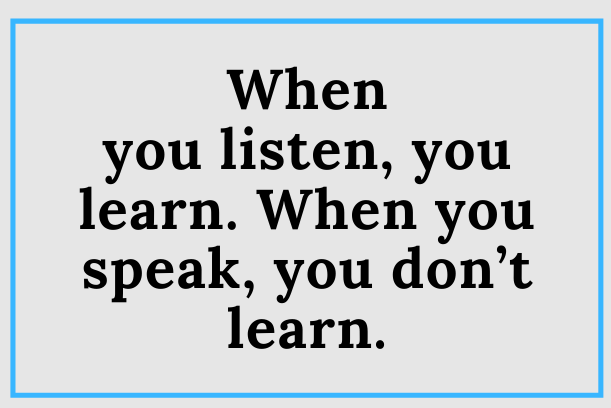 Listen First, Understand Second, Speak Third
Listen First, Understand Second, Speak Third
Principles such as honesty, integrity and trust can move humans toward positivity or negativity. Using these principles when we interact as humans is the basis for listening, understanding and then responding.
I talk a lot about influence, because that is exactly what leadership is – INFLUENCE. There are many ways to influence another person, both positively and negatively. I have found that one of my favourite ways to influence another person, is for them to influence me first.
The best leaders I have ever worked with or been influenced by, make the decision to be influenced first before trying to influence the other person.
The reason highly effective leaders like to be influenced first, is because they want to understand the other person. They don’t talk first, they don’t “but in” in the middle of the conversation, and they don’t tell them what they should or shouldn’t be doing…….They listen first, understand second and speak third.
When you are trying hard to see something, we sometimes strain our eyes so we can see it the best way we can. For example, seeing emotion on a person’s face and understanding how they feel.
When listening to a person, it is rare that we strain our ears to hear their words and understand their emotions and how they are feeling. This is something we should get better at.
When you have a one to one with your boss, do you feel important? Do you feel cared for? Do you feel listened to? If the answer is yes to all, then they are behaving like a true leader and letting you talk while they listen and understand you.

Or, does your boss control the one to one? Do they do most of the talking? Do they make you feel like you’re always being criticised? Do they seem like they don’t care? Again, if the answer is yes to all, then they are behaving like a boss, not a leader.
They are not listening to you at all and the one to one is all about them and not you. They don’t understand you because they are not listening. I have had many one to one’s like this in the past, and I am pretty sure you have too. It is not a nice feeling.
In the book “Leader’s Eat Last” by Simon Sinek, he talks about this exact concept of leader’s putting their team and others first. He talks about his experience of spending time with the US Marines, and that listening, understanding and being influenced first is most important to the leaders.
When your friends or family talk to you, do you listen or talk over them? If you talk over them, they will feel undervalued. If you listen and understand them first then they will feel important, and appreciate that you have taken that time. What people say to you is serious and it matters, treat them that way.
When it comes to you then listening to your boss; if you have an issue, either at work or at home and your boss has listened to you first, understood what you are telling them, and let you finish what you want to say, then you are more likely to listen to your boss when it is their time to speak.
Whatever their opinion or advice is on what you have just told them, you are more likely to respect, take on board, and take action on. This is the relationship between a highly effective leader and their team members.
However, if you want to discuss an issue with your boss, and they take over the conversation within the first few minutes, and want you to understand their point of view first, then you are more likely to not listen because you are concentrating on getting your point of view across.
I have had many conversations like this with previous bosses in the past, and again it doesn’t make you feel good. They haven’t listened to you, and by consequence you haven’t listened to them either.
For a leader or a boss, this is very risky because it puts them in a position of not being respected. The team will in fact resent their boss because he/she doesn’t listen and gives the impression that they don’t care.
If your boss isn’t listening to you, and they don’t want to be influenced by you, is there anything you can do? Yes there is. They don’t realise that they aren’t influencing you either. Remember, LEADERSHIP IS INFLUENCE.
YOU BECOME THE LEADER, WHEN YOU ARE NOT THE LEADER. Change position with your boss and lead them instead of them leading you. We all want to increase our influence, especially with our boss, and this is an excellent way of doing that.
This is why you can be a leader in your current role, you do not need to be a supervisor or a manager to be a leader. Although, you do need to be a supervisor or a manager to be a boss. But, we don’t want to be the boss, we want to be the leader.
To be the leader of your boss, you just need to apply the leadership principles you are learning. You can apply them with your team mates, the outside organisation, at home with your friends and family. Now, all you need to do is apply these principles in exactly the same way with your boss.
So, you’re now the leader, and your boss isn’t listening to you, what should you do? A highly effective leader would LISTEN FIRST, UNDERSTAND SECOND, AND SPEAK THIRD. A highly effective leader would listen to their boss and understand what it is that they are saying to them.
If you were to do that by being the leader, then when it is your time to speak, your boss is a lot more likely to listen to you, and take on board what you have said.

Then following that, you would feel like you have been listened to, feel cared for, and feel important to your boss.
As a team member learning to be a leader within their own team and organisation, this is one of the best leadership principles to try and master; listen first, understand second, and speak third.
By learning this leadership principle myself and trying to master it every day of my life, it really has improved my leadership and my life, both as an engineer, a manager and as a human being.
To be a leader within your team and your organisation, then building relationships with your team mates, your line manager and also their line manager is key.
When building on these relationships, ensure that you listen first, understand second, and speak third. In fact, use this principle with everybody you meet and want to build a relationship with, even beyond your career.
As humans we love to feel important, be the centre of attention and our own self-interest. This is where we get our motivation from to do something. However, when we listen to someone else then we have to give up our love of feeling important and we have to make the other person the centre of attention.
I welcome hearing how this post has influenced the way you think, the way you lead, or the results you have achieved because of what you’ve learned in it. Please feel free to share your thoughts with me by commenting below.
All the best,
Tags: Culture, Leadership, Transformation
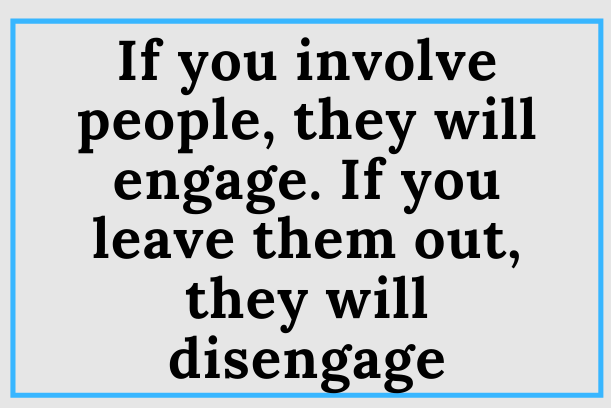 How To Engage With Others
How To Engage With Others
If you need tools, get them. If you need information, find it, or ask someone. Do not wait for tools and information to just come to you, and then blame others for not getting them. That is the act of a disengaged leader, not a highly effective leader.
Taking ownership of the team, and the results that the team produce is what a highly effective leader does. He/she will engage with others in the team, and be engaged enough to go the extra mile. In other words, they do more than the expectations of their boss, or the expectations of the organisation.
A highly effective leader will not rely on anybody else, either within their team, or from outside their team to take responsibility for the team’s results. If they did, they would not be highly effective.
A highly effective leader will always share the information they have that the team need. They will not guard it, or wait for one of their teammates to come and ask them for it. They are engaged enough to know what the team needs, and then will engage with the team by providing what the team needs before they need it.
If a highly effective leader needs information themselves, they will engage with the people who have this information and ask them for it. They will not wait for someone to approach them to give them the information, and most of all they will not blame others for not providing the information they require.
A highly effective leader is very deliberate when seeking out information, and by engaging with the right people, they will get what they need.
In the team you are currently in, who are the most engaged teammates? What level of engagement do you have with your teammates, and your organisation? If your leader had a team of highly effective, fully engaged leaders, imagine what you could achieve.
When a low performing leader has information that their team needs, they like to hold onto it and guard it. They do this because they think that by providing others with information that will help the team, will actually help others get ahead of them. It is a very paranoid mindset that they have in these cases.
Even if a teammate asks them for this information, it will be a strain for them to give it to them. However, when a low performing leader needs information that will help them, they expect a teammate to approach them to give it to them. They will not seek out the information for themselves.

By doing this, it gives them an excuse to blame others for not providing them with the information they required. They think by blaming others, it takes the bad light off them and onto the team. When actually, most people can see through their excuses. This is an extremely disengaged attitude of a low performing leader.
I have first-hand experience of being part of teams and leading teams of how disengaged teammates behave.
For example, you will hear low performing leaders saying things like, “Nobody told me, so how am I supposed to know?” “Didn’t you know that I needed to know that?” “You should have told me earlier, not today.” “I’m sorry, but that’s not my responsibility.”
You have probably heard similar statements to these yourself. You may have said these yourself. I know I used to say them before I started to work on myself.
One thing I have realised over the years, especially in the engineering industry, is that people are very reluctant to go the extra mile unless they are paid to. I have worked in engineering teams that worked shifts. By working shifts, it meant you would get paid overtime if you did extra hours.
So, whenever we were asked to stay on extra hours, we would gladly do it because we got paid time and a half, or sometimes double time. However, when we were taken off shift, and moved to just salary based, it meant there was no more overtime.
So, whenever we were asked to do extra hours, we ALWAYS said, “No way” because we were not being paid for it. That is a low performing team, and an extremely disengaged team.
If you hear one of your teammates say things like, “I’m only here to get paid.” Or, “I’m not doing that, it’s not my job or in my job description.” Then you will know they are low performing leaders, and are disengaged with what the team is trying to achieve.
It’s very sad to hear people who are on your team say things like that. They are basically admitting that they are happy to stand back and let the rest of the team do the tasks that they know they can perform.
They are admitting that they don’t care if the team achieves good results or not. They do not care about anybody else but themselves. Are you OK with having people like that on your team?
I ask that question because I am not OK with people on my team behaving this way. By being disengaged with the team, and what the organisation is trying to achieve, they are not helping anyone. Especially themselves. A low performing leader is never going to be offered any new opportunities, pay rises, or job promotions.
They actually think the reason they are not being offered these things is because of other people. So they blame others for their own shortcomings, which is completely wrong. The fact that they are still in their job after a number of years of behaving in such a way is a miracle in my eyes.
As a highly effective leader it is your responsibility try to help the disengaged become more engaged into what the team is trying to achieve, why the team is trying to achieve it, and ultimately what the organisation is trying to achieve.
So, how do you do that? Well, we must try to understand why the disengaged person feels and behaves in such a way. What is it that is driving them to be like that? Why are they not engaging like we are as highly effective leaders?
Sit down with them and have that conversation with them. As a highly effective leader, you are a leader, so it is your job to listen to the person to understand what it is. Then react to what you now understand with some actions that you are going to take to help them.
Remember, it is about HELPING them to become more engaged. That could be taking them under your wing, and leading by example. Explaining why you are an engaged person, and why you want to achieve great results. Doing whatever we can to help them change their attitude.
I was once a disengaged person, and I used to blame anyone but myself for things that didn’t happen in my life, not only at work either. I was focussed on blame, and I did not take ownership for anything. I actually believed that anything negative that happened in my life was someone else’s fault.
That was until I started working on myself every day, and took ownership for my life. After all it is MY LIFE. That is what a low performing and disengaged leader needs to realise. And we need to help them realise that, and then offer more help so that they can become engaged.
I received help from my teammates and also my mentor Ron who you now know about. This is your opportunity to do the same with any negative, or disengaged people you know or work with.

When you can help a person to become more engaged, you will start to see differences in that person. They will stop blaming others, especially teammates. But, most of all, they will become more of a positive person, and will try to help others to become more engaged.
It is a snowball effect, and it is very addictive. I say that because when you see the differences in the person you have helped, you want to do it again and again.
Being a positive, highly effective leader is how it starts. Turning a negative attitude into a positive attitude is how it begins with becoming more engaged. If you can do that first, the rest is easy.
When you help a person change, just watch to see how much they want to change things for the better. The person who would gladly stand back and watch the rest of the team do the work, is now on the front lines trying to be involved in everything.
The person who would not go the extra mile because they were not getting paid, is now going miles and miles whether they get paid or not.
The feeling when you see that change in a person because of your help is amazing. Do you want that feeling, and do want to see that change in your team?
I welcome hearing how this post has influenced the way you think, the way you lead, or the results you have achieved because of what you’ve learned in it. Please feel free to share your thoughts with me by commenting below.
All the best,
Tags: Culture, Leadership, Transformation
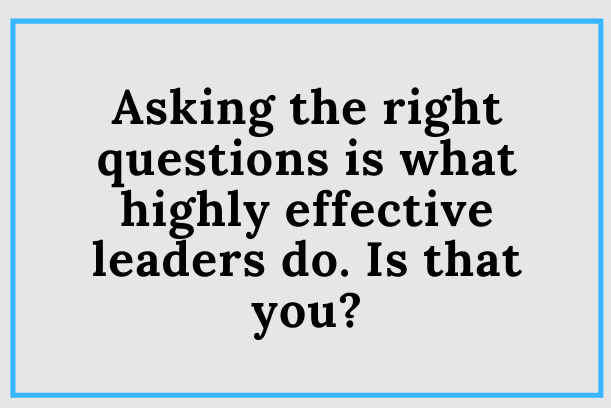 Do You Ask Your People The Right Questions?
Do You Ask Your People The Right Questions?
When a highly effective leader asks questions, they either want to learn something new for themselves, or they want to inspire their team to think differently and for themselves. So, when you go back to your team and you begin asking questions, always have those two things in mind.
You are not telling anybody what to do, you either want to learn, or you want to inspire self-thinking.
How do you do that? You may be asking. If you are seeking to learn new knowledge from your team then ask “why?” If you want to help your team to think differently and for themselves, then ask “how?”
Highly effective leaders are very skilled at asking these types of questions, and they are very deliberate with this technique. They either have a goal to learn, or a goal to help.
When asking the question of “how?” this can be very powerful when a new change is being implemented either within your team, or within the organisation. Asking “how?” enables you to be proactive, and embrace the change. Rather than reactive, and fear the change.
Most are reactive when it comes to change, so being proactive will put you and your team in the minority. However, it will put you and your team in a better position, and people will start to take notice. Especially your immediate senior leaders, and other senior leaders within your organisation.
As the leader of your team, reacting negatively to change, and fearing change will influence your team to react and behave in the same way. So you are negatively influencing, rather than positively influencing. This is something you need to avoid.
Leaders who react negatively to change are looking for the cons of the change, and don’t even consider the pros. Even if the pros outweigh the cons, a leader who fears change will still focus on the cons. When leaders behave in this way, they and their team will become a victim, rather than the recipient of change.
When you become the victim of any change, it will feel that the change is happening to you, rather than for you. When change happens to you, you will not have any control over the change, and neither will the team. Your team will feel like they have been manipulated, and if you cannot show leadership then this will create distrust.

If you are not thinking positively about this new change, then your negativity will flow into other aspects of your work.
Highly effective leaders embrace change, and they are proactive to change rather than reactive. When a highly effective leader embraces change, they are also embracing the responsibility that comes with it. By embracing, and accepting the responsibility, that is how they are proactive to the change.
Usually, when a new change is being brought in, people ask the obvious question of, “What is happening?” However, a highly effective leader’s first question to a new change begins with “How?” When asking “How?” you are seeking the solution from the very beginning, which is a lot more powerful than asking “What?”
Many times in my career, when a new change is about to come into the organisation, you always hear the same questions from the negative people. Whether they are the leaders, or the team, they are always the same as the following:
These types of questions are a reaction to a new change, and is a very negative response.
When a highly effective leader and their team embrace a new change, they turn the questions around, and will ask the following:
As you can see, just putting the word “How?” at the beginning of the questions, gives a whole different perspective on yours and your team’s way of thinking. It completely changes your way of thinking from negative and reactive, to positive and proactive.
A new change usually means a different way of being and behaving. So, we must accept the responsibility that comes with this new way of being.
Leveraging the question of “How can I?” or “How can we?” rather than, “Can I?” or “Can we?” is how highly effective leaders embrace and accept the responsibility, and lead themselves and their team through positive change.
Highly effective leaders have no doubt that the change they are leading is the right thing to do.

When a low performing leader asks the question, “Can I?” they are doubting themselves already, and being negative. There is no substance to the question “Can I?” so you don’t know whether you can or you can’t.
However, when a highly effective leader asks, “How can I?” they are making a commitment, and have made the decision that they can make this change happen, no matter what.
When this commitment is made, the only thinking you will do will be in a positive direction, and if you come up against any obstacles, you will find the solution to remove them. The word “How?” puts you and your team on the right path.
When you are thinking positively about any type of change, whether that be in work or at home, you will always find a solution. There may be more than one solution, but you will think of them all and decide on the best one. Just by using the word how. Teach your team to do the same thing, and they will start thinking in this way too.
Low performing leaders will always be the victim to change, and because they play the victim they will feel stuck. It is like they are stuck with the change, instead of embracing the change.
When a highly effective leader embraces the change, they will feel unstuck and creative. They see the change as a benefit for all, and do everything they can to ensure the change is seen through to the end.
When it comes to a new change being brought in for your team, department or organisation, then ask yourself the “How can I?” and “How can we?” questions above. See for yourself how different you will be thinking, and how different you feel. You will feel a lot more positive and accepting of the new change.
Then, once you have asked yourself, and the team has asked themselves these positive questions, ensure you take positive action. Don’t just ask the questions and do nothing. Take positive action and see what happens.
You and your team will start to devise solutions for obstacles, rather than just coming up with obstacles that you don’t do anything about. Train your team to put “How?” in front of “Can I?” and feel the difference from being reactive to proactive.
I welcome hearing how this post has influenced the way you think, the way you lead, or the results you have achieved because of what you’ve learned in it. Please feel free to share your thoughts with me by commenting below.
All the best,
Tags: Culture, Leadership, Transformation
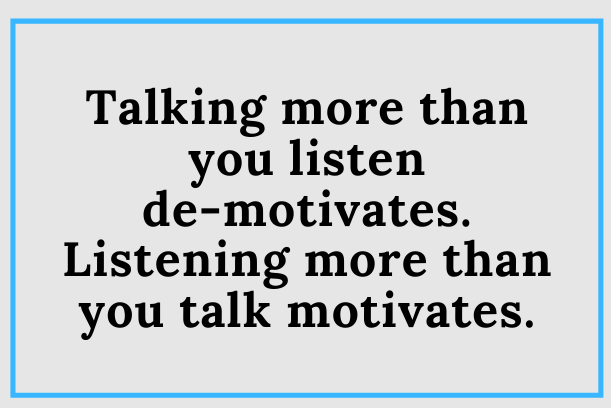 Do You Listen More Than You Talk?
Do You Listen More Than You Talk?
Early in my leadership career, I thought that it was the leader’s role to do most of the talking when in conversation with my team, or as individuals. I thought it was the leader’s role to stamp their authority on the team, and that the team should listen to the leader.
This was a big mistake on my part because we now know that the leader’s role is to do the exact opposite.
I didn’t know what I didn’t know back then, but I was continually learning, and I learned quite fast that it wasn’t up to me to do most of the talking (20% of the talking). It was up to me to do most of the listening (80% of the listening).
I thought of myself as the “expert” because I was in the leadership position. But I was by no means the “expert”. I had a team full of experts, so I should have listened to my experts a lot more, and leveraged their expertise.
When I started reading leadership books and taking my leadership development more seriously, my listening skills started to improve. I was also improving at letting my team members do 80% of the talking in our conversations.
Especially when we were talking about their frustrations, or personal issues. My leadership styles were improving every day, as I worked on myself every day.
Asking questions of my team, rather than giving them the answers or suggestions was something I developed too. Especially open questions that would enable my team member to draw out more information from inside themselves, and eventually work out the solutions themselves with my guidance.
By doing this I was respecting my people, and they would respect me because I listened to them.
When asking your team members questions and helping them draw out their own answers and conclusions, it takes more time than just telling them the answers. But, it is worth taking more time because you are going beyond communicating when you listen 80% of the time.

You are connecting with your team. When connecting you are increasing your influence, and building up stronger trust with them.
What you will find is, when you make stronger connections with your team, they will become more successful. They will achieve more, so again it is definitely worth taking more time with them by asking them open questions (what?, who?, where?, why?, how?).
When the team start to become more successful and achieving more than they thought, you will find it even easier to get them to buy-in to you, your ideas, and any changes you want to implement.
You and the team will grow together, and you will grow closer. You will no longer need to set the direction for the team, they will happily follow you on their own down the right direction.
The team will choose to stand beside you and unite as one team. When that happens, you will know that your influence is increasing with the team every day.
To return the team’s loyalty, trust and faith in me as the leader, I would do my best to help the team as much as I could. I would help them to solve their problems. I would support them and use my leverage to promote any new ideas that the team had.
I would ensure that my presence wasn’t an obstacle to them at any time. I would remove obstacles for the team when they needed me to. I would constantly be available to listen to the team. I would continue to ask the team open questions when it was necessary.
There were occasions when I would let team members lead the team, and myself when it was needed. When I listened to the team I was being led. By listening to them team, I was creating leaders. By writing this article for you and building this website, I want to create a highly effective leader out of you.
Since working in the engineering sections of the rail industry, one thing I have always been associated with is train performance. Have trains performed well in service? Was there any delays? Was there any failures/breakdowns? Was there any cancellations?
What has been the worst performing train this month? What component has caused the most failures this month? What are we doing to improve performance?
These are all questions that I heard every day as part of the rail industry. When I was engineering technical manager working in London, there was one particular fleet of trains that had been performing very badly for about three months straight in 2016.
The leaders of the business wanted to know why. So they arranged a meeting for my managers and I to present to them the reasons for poor performance, and what we were doing about it.
There were so many reasons for the fleets poor performance; doors failing, couplers not interlocking properly, brakes issues, wheelsets wearing, etc. This fleet had been poor for years, but the engineering team had just done enough to keep it going.
They didn’t go the extra mile to work as a team to improve their own, and the train’s performance beyond expectations.
I knew I had a challenge on my hands. So, instead of laying into the team and demanding ideas of them, me doing most of the talking, I decided I would change it around. I decided I would let them tell me, and I would listen to what they thought.
I wanted to find out from them why they hadn’t gone beyond expectations. I wanted to know their ideas so we could implement them and turn performance around.
The team felt like they had never been listened to before, so it was difficult to get them to open up at first. This was new territory to them, they didn’t know whether I was trying to manipulate them, or if I was being genuine. So, I stopped.
I decided that it was up to them to come back to me with a solution on how to improve performance, and they were going to present to the senior leaders.
When I made this decision, the team were not happy at all. They didn’t want to work on this as a team, and they didn’t want to present to senior leaders.

So, they got together in a meeting room to brainstorm their ideas, but all they did was bad mouth me for making them do this. They couldn’t come out with any ideas, so they wasted the whole time they were in the room together supposedly brainstorming.
So, when I went in to their “brainstorming session” and found that they were just moaning, instead of working, I thought I would try again to get them to open up. I asked them open questions, and then would listen to them.
For about three hours I listened to the team tell me why they shouldn’t be doing this, why the trains performance will never improve, why the fleet of trains should be scrapped. Every negativity that they could come up, I listened to for three hours.
So, I made another decision. I decided that I agreed with what they were saying. I said to them, “Ok guys, if that’s what you’re telling me, then we can’t go any further. Let’s end the session here.” They were surprised at my reaction because they were expecting me to fly off the handle.
But, I didn’t. I then told them, “Make sure that when you present to the senior leaders that you tell them there is nothing we can do.” They looked at me and said, “We can’t say that to the bosses, they will fire us.”
I said, “You’re right. But, you have decided there is nothing you can do, and I don’t lie to my bosses. So make sure you tell them the truth.”
Straight away, they decided they will start the brainstorming session again and come up with a solution. So, I left them to it. The next day, they had a full presentation of the reasons for poor performance, and three new modification ideas that would help the trains to improve their performance.
When they implemented the new modifications later in the year, the train’s performance improved. All by working together as a team.
I welcome hearing how this post has influenced the way you think, the way you lead, or the results you have achieved because of what you’ve learned in it. Please feel free to share your thoughts with me by commenting below.
All the best,
Tags: Culture, Leadership, Transformation
 Do You Ever Try To "Wing It"?
Do You Ever Try To "Wing It"?
I have been part of the engineering industry since 1999, and in that time I have worked with an automotive company, a gas and heating company, and many railway companies. All these types of companies have a lot of things in common, but one of the main things is “gossip.”
You probably know this yourself. I don’t think one day went past when I didn’t hear a new rumour about someone or something, throughout my whole career. These rumours usually came from people who either just made them up, or they heard something and got the totally wrong end of the stick.
It was incredible because as I climbed the leadership ladder, I found that no matter what level you are in the organisation, the rumours are spread everywhere. They could have come from the highest level in the organisation or from the lowest. Everybody spread the gossip.
The reason people spread gossip or rumours was to try and get everybody else to see them as “go to” people for information. They thought that this would make them more credible within the organisation or their department. But, most of the time the information they spread was either untrue, or completely off from the actual truth.
So most of the time, their credibility would be lost because they were spreading misinformation. I found it strange that people who didn’t have a clue what they were talking about, would spread information that they were not even 50% sure of.
Rumours and gossip can come from every level of the organisation or industry, not just at the lower level teams. Sometimes it becomes a rumour by default because the CEO says something they believe to be true, but doesn’t 100% know it.
Then someone who was in earshot of the CEO may spread what they say, and it turns out to be untrue. That will discredit the CEO because everyone will know it came from him/her.
Others may receive information from someone they confide in 100% and would not believe that they would give them false information. So with that belief in tact, the information will be spread, which again turns out to be untrue.
This will discredit the person spreading the information, and also the source of the information, which is the person who they 100% confide in.

A highly effective leader at all costs will not spread any information unless they know 100% that the information is a fact. They will never spread something that they are less than 100% sure of. A highly effective leader values very highly their credibility and integrity.
If they share something that they are unsure of, they risk losing their credibility and integrity, so they will avoid doing that. If you spread something that you do not have 100% certainty that it is true, then you are placing a very high risk on yourself.
You will lose your credibility and integrity, and your reputation as a highly effective leader will be damaged.
When I started out my leadership career as a project manager, I learned very quickly that I needed to think before I spoke. But not only that, I needed to ensure I had certainty over what I was saying.
A highly effective leader will always have certainty over what they say, otherwise they won’t say it. Having certainty is a trait of all highly effective leaders.
When I was an engineering production manager working on the railway in Scotland in 2011, I learned a very valuable lesson. Never try to “wing it”.
Whenever I was on dayshift, it was my job to present the morning brief to the senior leaders on the performance of the trains from the previous day, and what engineering issues had happened. Part of the briefing was to give details on whether or not the engineering issues had been fixed, and if the trains were serviceable again.
I remember one particular engineering issue had caused the trains over 100 minutes delay in service (this happened at least once a week). Anything that caused over 100 minutes delay had to have a thorough investigation, and a report written.
I was not fully informed on what happened, or if the issue had been fixed or not. So when I was asked the question, I was so frightened because I didn’t know, that I told my boss that the incident had been fixed. When in fact, my boss knew more than I did, and he was trying to find out how much I knew.
Unfortunately for me, the issue had not been fixed and the train would not be serviceable for another day or two.
As you can imagine, my boss was not very impressed to say the least. He gave me a right good “telling off” in front of everybody in the room. I was so embarrassed because there were people in the room who I managed. To be honest, a “telling off” is quite light compared to what I really got from my boss.
But, from then on I had learned to always be 100% certain, and if you don’t know something, just say you don’t know.
Another lesson I learned was to make sure that my team had 100% certainty too whenever they were relaying information. I did not want them to make the same mistake as me by “winging it.” So whenever we had a team meeting and I asked a question like, “what happened when…”
Or, “Do you know how this happened…” If they gave me an answer which explained that they knew what happened, I would always ask a follow up question like, “How do you know?” I wasn’t trying to catch them out, I was trying to help them be 100% certain.
There were occasions when certain team members tried to “wing it” with me, however I would always tell them about the mistake I made, and that they should not do the same. This helped them, and enabled us as a team to ensure we always had 100% certainty.

Since making that mistake in 2011, I have become very comfortable with telling people “I don’t know.” For me, being able to do that is good leadership. I will never tell anyone that I know something when I don’t. If you do that, it means you are an insecure person.
However, if you are comfortable with saying you don’t now, it shows the other members of your team, and the leaders that it is ok to say “I don’t know.” So it will benefit those around you too, which again shows good leadership and is a powerful message.
Another powerful message is telling your team that it is not ok to “wing it” or say you know something, when in fact you don’t. Highly effective leaders will never try to “wing it.” If they do then they will lose their credibility and integrity, and damage their reputation.
A low performing leader on the other hand are insecure people, and it is highly likely that they will try and “wing it” when they don’t know something. This brings out their insecurities to the forefront.
A highly effective leader is a very secure person and will always say they don’t know. The thought of “winging it” doesn’t even enter a highly effective leader’s head.
Throughout your organisation and your industry, no matter what you say, your credibility and integrity is at stake. So ensure that you have 100% certainty on everything that you say, that includes when you say, “I don’t know.” If you want to gain the trust from your team and for them to allow you to influence them, you must have certainty.
To have certainty is a very valuable lesson to learn, and should be practiced every single day of your life, and every time you speak. You never know who is walking by and listening to what you’re saying. It doesn’t matter if you’re in the lowest position in the organisation, or the CEO. Every single person must have certainty every day.
When working on ourselves, we must turn the lesson of having 100% certainty into a habit. We must practice this so much that it becomes second nature, and it must feel very uncomfortable to us if we ever try and “wing it.”
We must also help others who we find that do try and “wing it.” Sometimes people try to “wing it” out of fear, like I did in 2011. By helping others and showing them that it is ok to say, “I don’t know” will show really good leadership.
I welcome hearing how this post has influenced the way you think, the way you lead, or the results you have achieved because of what you’ve learned in it. Please feel free to share your thoughts with me by commenting below.
All the best,
Tags: Culture, Leadership, Transformation
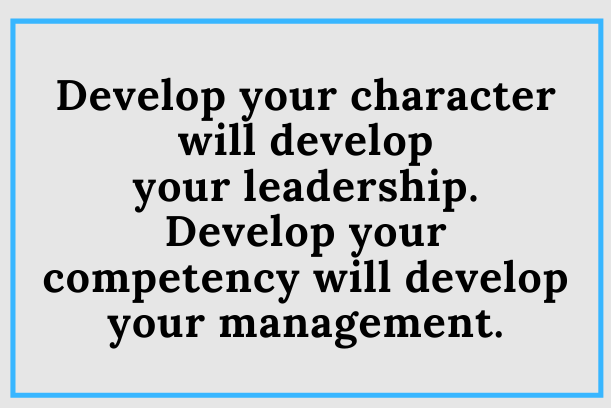 Do You Develop Your Character Or Competency?
Do You Develop Your Character Or Competency?
There are many styles of leadership, and different leadership principles that I discuss throughout my website and my videos. One thing I have learned over the years is, there is not one size fits all. In other words, every individual and team is different. Every circumstance and situation is different.
Just because one principle or style worked with one person, doesn’t mean it is guaranteed to work with the next person. It takes hard work to understand our people, and how we can help them and add value to them.
I have worked with many leaders who said that they made a success of themselves in a previous leadership role. So, they came to work with us thinking they could behave, lead, and treat us in exactly the same way, and it would be another success. How they were wrong.
They didn’t understand that there was not one size leadership style fits all. They thought their new leadership role with us would be a breeze, when actually it was much, much harder than they thought. Some of these leaders learned from their mistakes, and did their best to work hard with us, and help us.
Others were too stubborn, and in the end were removed from their position because they were making things worse.
Organisations are far too focussed on results, when they should be focussing on their people and their culture. When organisations bring in new leaders, their main objective and priority is to improve the results. I am not saying we shouldn’t focus on results, but they should not be the priority.
The people should be the priority. Protecting the culture and living the company values should be another priority of the leaders. Having respect for the people should be another priority. Without respect for the people, there is no way of protecting, or keeping the right culture and environment for the people to work and thrive.
Focussing on processes and results will damage the culture, will damage the environment, and most of all damage the relationship with the people.
The leaders who were stubborn were not willing to let go of what they had learned about leadership, unlearn it, and then relearn new leadership principles that would help them in their situation. They were failing in their leadership of us and their other teams, but were not learning from their failings.

To unlearn, and then relearn something new, that is the mindset of a highly effective leader. You need a strong mindset, and be willing to accept and admit that you don’t know it all. We need to be learning every day. That is why highly effective leaders work on themselves every day.
The mindset of a highly effective leader is to be constantly improving. Their thinking is, if I improve myself, I am making myself more valuable to my team. By being more valuable to my team, I am in a great place to help them become more valuable too.
How valuable to your team are right now? Do you feel that you are adding value to your people? Are you willing to challenge yourself, and work on yourself every day to become more valuable?
There are two principles I would like you to focus on when working on yourself:
You should focus on continuous improvement 20% of the time, and focus on having respect for your people 80% of the time.
Respect for your people is the most important principle, which is why we focus on it the most. It is the foundation of leadership, and will support every other leadership principle that we study, practice, and improve. Highly effective leaders think about respect for the people more often than they think about anything else.
They spend 80% of their time thinking about how to respect their people.
When highly effective leaders focus on continuous improvement, they are working on themselves to become more valuable. By becoming more valuable, they will continuously improve on the value they can add to their team. Continuously improving on their value will in turn make their team more valuable.
Adding value to their team, and helping them become more valuable is how to respect their team. When the team feel respected they will improve. If they feel disrespected, they will not improve. Highly effective leaders spend 20% of their time thinking about continuously improving.
When leaders want to implement new ideas, or bring in a new change, it is imperative that they work hard on influencing their people to buy-in to the new idea or change. What is the best way for them to achieve that? By respecting the people.
If the leader has respect for his/her people, the people will respect them in return, and will buy-in to the new change. If the leader dis-respects his/her people, the people will dis-respect them in return, and definitely won’t buy-in to the new change.
When highly effective leaders want to increase their influence with their team to create buy-in, they must first work on themselves to develop their character, and competency. They focus on developing their character 80% of the time, and they focus on developing their competency 20% of the time.
Developing character is how a highly effective leaders improves how they lead their team, and how much they respect them. Developing competency is how a highly effective leader improves how they manage the processes and policies they have accepted the responsibility for.
Leadership is focussed on people. Management is focussed on processes, policies, and things.
Most organisations provide the training for the people so that they can improve and develop their competency. This is so they can carry out the day-to-day job they were employed to do. However, they don’t provide the leadership development training so that they can improve and develop their character.

This is why you have highly effective managers rather than highly effective leaders.
The leaders of these organisations focus on competency over character. When focussing on competency development more than character development, they are focussing 80 – 90% of their time on continuous improvement, and 10-20% of their time on character development.
May be even less time on character development. They have it the wrong way around.
The leaders of these organisations don’t even think about developing their own character, never mind the people in their charge. It’s an unfortunate fact, but these organisations are prioritising and focussing on the wrong things. This needs to change.
Low performing leaders will tell their people that they are developing them, but they actually aren’t. They manipulate their people to get what they want by telling them, “This task is part of your development.” When actually, it is a task that they have done many times before, or has nothing to do with what their team is about.
They manipulate their team for very selfish reasons. They do not think about how their team thinks or feels.
To be a highly effective leader, you must increase your influence with your team. To increase your influence you must develop your character, and you must also develop the character of each of your team members, so that they can increase their influence.
You must also help your team to develop their competency so that the processes improve along with the people. To be a highly effective leader, you must become a highly effective leader. Focus 80% on character development, 20% on competency development.
The more character you develop, the more respect you will have for your people. The more respect you have for your people, the more character your people will have. Remember, to grow your people, you must grow yourself.
What is your business about? People, things, or results? Focus on the things, you are not developing your people, and not producing results.
I welcome hearing how this post has influenced the way you think, the way you lead, or the results you have achieved because of what you’ve learned in it. Please feel free to share your thoughts with me by commenting below.
All the best,
Tags: Culture, Leadership, Transformation
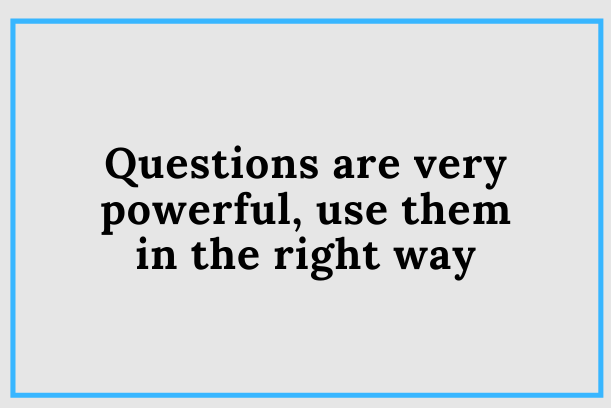 Do You Solve Problems For Your People?
Do You Solve Problems For Your People?
I like to talk quite a bit about asking questions of your team, rather than giving them the answers, and solving their problems for them. The reason for that is, questions is what a highly effective leader relies on.
They use questions as a tool to get their message across to their people. They use questions as a tools to gain buy-in from their people. They use questions as a tool to increase their influence with their people.
When I learned, and decided to stop trying to solve problems for my team members, I always had the same question to whatever their question was. My first question was always, “What’s the problem?” My team would get confused by that question because they think they have just told me.
But, asking “What’s the problem?” made them think again and dig a little deeper. I wouldn’t stop asking that question until they had thought a little deeper, and come back to me with the actual problem.
A lot of the time, my question should have been, “Who is the problem?” because the problem did usually start with the person seeking help. The only real problem was, they didn’t know that they were the problem.
And, they didn’t know that to solve the problem, they had to think a lot deeper than what they were thinking, or if they were thinking at all.
After a while, the team knew that if they came to me with a problem, I would ask them the same question every time, “What’s the problem?” So, they did their thinking beforehand, and when they did that, they realised that they didn’t need to come to me anymore because they had already solved the problem.
I must admit, I did find it quite fun when the team would come to me with problems, and I would ask them, “What’s the problem?” because I would go and observe them thinking deeper about the situation, and it gave me a sense of pride.
It made me feel good that I had prompted my team to think a lot deeper and solve their own problems. It was a very simple, but very effective thing to do.

When I was a leader of a team in the railway, we were responsible for solving train problems, especially when they broke down in service. So, if I saw a team member trying to solve a train problem while sitting at his desk, I would change my question from, “What’s the problem?” to “Where’s the problem?”
If they were going to get to the root cause of an engineering problem on a train, wouldn’t it be better to be exactly where the problem was?
When I asked the team that question, they knew immediately to leave the office and go to where the problem was. I used to do this myself when I was a young engineer, but in those days it was rare you could get out of the office because the manager always wanted to keep his eye on us.
However, a highly effective leader is very visual in how he/she thinks. That is why casting a vision of the future for the team is so important.
They also know how important it is to see a problem, not just rely on spreadsheets, data, and information being told or sent to them. Whenever I got the opportunity to see a problem, I knew I had a much better chance of solving it.
So, if you have a team member who is responsible for a problem, then you need to give them the best chance they can at solving it. That means letting them go to the problem. Don’t keep them in the office so you can keep your eye on them. Give them the freedom, and the tools to solve their own problems, wherever they may be.
If you don’t give them this freedom and opportunity to solve their problems, then you will ultimately be responsible because you are responsible for your team member.
I liked to ask my team that when they think they have solved a problem, they should report back to me with a report or presentation. This would give me the opportunity to ask more questions, and get my team thinking even deeper, and assure me that the team have done everything they could.
The type of question I would ask during a presentation are, “How do you know that the problem is solved?” If they could answer that question well, then I was satisfied. However, if they answered me with, “I just know.”
Then that would not be acceptable. Especially if they had seen the problem and they were just relying on information passed to them by somebody else.
There are far too many big decisions being made in organisations that are based on poor data, poor information, and hearsay. They are the main problems in a lot of organisations throughout the world.
Big decisions need to be made together as a team, and based on actually seeing and solving problems in the right way. We cannot make decisions based on gut feelings, or information we found in the system from a year ago.
I know it takes a lot more time to give your team the opportunity to solve problems correctly. But, take it from me, it takes a lot more time when you make a decision on something based on poor information, and you have to start all over again or backtrack.
Asking questions until you cannot ask anymore is the only way you can be 100% sure everything has been done to solve a problem.

As I have said before, when you ask your team questions, and you are helping them to solve their own problems, you are showing your team respect.
They will feel a lot more valued, and will follow your lead by asking each other questions when they are collaborating on problems. When collaborating on problems, and asking questions of each other, they are showing each other respect too.
Earlier, I told you that one of my old managers wouldn’t let me go to see problems on trains in service because he wanted to keep his eye on us. Well, this same manager would often ask us questions too. He would often ask, “Why are you doing that Tom?” or “Who told you to work on that?”
Whenever he would ask those questions, I would feel nervous or intimidated because what he actually meant was, “What you are doing is wrong.” Or, “I don’t want you to work on that.” So, they were asking the wrong questions.
When I started to ask questions, I had a completely different outlook. I thought like a child did. Why? You might be asking. Well, if a child asks you, “Why are you doing that?” they do not want you to stop what you are doing, they actually want to know so that they can learn from you.
That is exactly the frame of mind I have. I actually do want to learn from my team. I have no interest in getting them to stop what they’re doing, or telling them that they are doing it wrong.
When I explain to my team why I am asking them, “Why are you doing that in that way?” they are a lot more relaxed and open to explaining it to me. They know that I do genuinely want to learn from them.
It’s a great feeling when you begin to see your team asking their teammates the same kinds of questions, and because they genuinely want to learn. They do not want to stop them from doing anything, or blame them in anyway.
I welcome hearing how this post has influenced the way you think, the way you lead, or the results you have achieved because of what you’ve learned in it. Please feel free to share your thoughts with me by commenting below.
All the best,
Tags: Culture, Leadership, Transformation
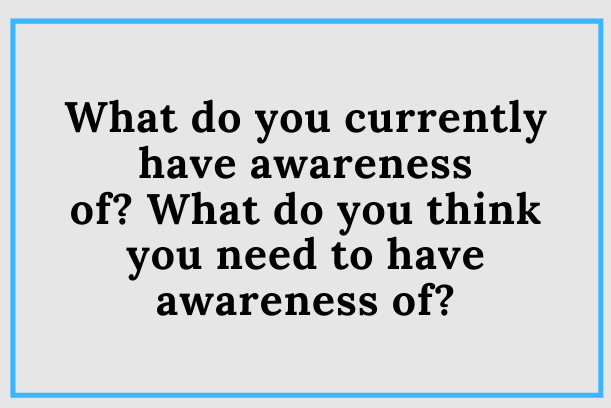 Are You Aware Of Your Potential?
Are You Aware Of Your Potential?
By becoming a highly effective leader, there are a lot of things that you need to be aware of, and one of those things is to have awareness. When it comes to the differences between an ineffective leader and a highly effective leader, one of those differences is how aware they are. A highly effective leader’s awareness level must be higher.
To help you raise your level of awareness, you must keep working on yourself every day in both the competency and character areas. Reading this post is a great start in making you more aware. However, there are hundreds of self-development books out there that can raise your awareness level even more.
So, when you finish this post, don’t stop there. Keep searching through my other posts that can help you continuously improve as a highly effective leader, and eventually create a team of highly effective leaders.
You will learn about more people (besides me), and their stories throughout their lives and career. The more stories of highly effective leaders you can relate to, the better it is for you.
To help make you even more aware, increase your influence, and help you raise your leadership level then read through my other articles, and keep an eye out for my future posts. You can check them out at here.
I have been reading self-development and leadership books since 2009, and with every new book I read I am becoming a lot more aware. I read daily, and this is a part of how I work on myself every day. I encourage you to do the same. You can learn from me in my other posts about working on strengths and weaknesses.
To work on your strengths in the area of competency, reading will help with that. To work on your weaknesses in the area of character, reading will help with that too. Being deliberate in these areas is a must…every day.
Highly effective leaders take action every day with their development and personal growth. They are also constantly seeking response and feedback from their leaders and teammates on how they are doing.

Highly effective leaders have very high levels of self-awareness, but there are times when they can’t see everything. So feedback from teammates helps them in the areas they can’t see for themselves.
Being aware and being focussed is the ultimate goal when it comes to a highly effective leader and their team. One thing a highly effective leader has great ability in is the ability to focus on what the team is trying to accomplish, the mission.
However whilst being focussed on the mission, they also have awareness of what the organisation is trying to accomplish, the objective. By being able to do both, nothing will be lost. The team will be able to achieve both their own mission and still contribute to the organisation’s objective.
We have talked in detail about motivation and inspiration. As a highly effective leader is working on themselves every day, and increasing their awareness level every day, they are in a great position to help their teammates increase their awareness level every day too.
As we now know, a highly effective leader can motivate their teammates with ease. A highly effective leader is inspired from within to help develop their teammates and their personal growth.
They don’t need any motivation from anyone else to be able to do that. A highly effective leader’s mission is to grow their teammates and increase their influence.
This is who a highly effective leader is. They are part of the team so they can add value to the team. It is what they do. They are so aware of themselves, and know themselves inside out, better than anyone else. They are fully aware of their own purpose, and they are fully aware of their own passion.
They use their purpose and passion to help the team, and give them the most benefit possible from it. A highly effective leader is not seeking any type of reward or recognition for it, they are happy to be in the background remaining highly effective.
For many years as I was going through my career, and living in different places, I caught myself looking backwards a lot. I would think of Scotland and wonder “I wish I was still in Edinburgh.” Or, I would think of my hometown Liverpool, “I should have stayed home with my family, I miss them.”
These are nice things to think about, but the past is something we shouldn’t dwell on or criticise ourselves about. When we learn something new, we imagine what our past life, or our past job would have been like if we knew this new thing we have just learned.
We think, “I should have done this is I’d known.” Or, “I could have done that if I’d known.” The past is something we should think about and reflect on, not dwell on. What we should focus on is the future.
Now that we are learning new things every day because we are working on ourselves every day, we should look forward. We should be excited for what’s in store for us with our newly found skills and insights. It is thinking like this that will keep our awareness level high, and it is thinking like this that will raise our awareness level.

When I stopped dwelling on my own past and instead began to reflect on it, I started to learn more about myself. I reflected on my past mistakes, learned the lesson from those mistakes and vowed to myself to do my best never to make those mistakes again.
The more I reflected, the more I learned. The more I learned, the more aware I was becoming. I wasn’t just becoming more aware of myself, I was becoming more aware of those around me.
It’s amazing what you feel and realise when you change how you think about your past, and use it as a way to learn, not as a way to beat yourself up or criticise yourself.
When you look inside yourself right now, how do you feel? Are you beating yourself up? Are you criticising yourself? A highly effective leader is constantly looking inside themselves, and learning about themselves. They are also looking at their teammates and learning about them too.
A highly effective leader is so aware of both themselves and their teammates. By being aware of others on your team, you will know exactly how to motivate them and how to influence them.
The more you learn about yourself, and you start doing things differently, you will not only become a highly effective leader, you will become a better person overall. Highly effective leaders don’t just have to do things better, they have to be better.
Raising your awareness level isn’t just about your competency and what you can do, it is about your character, and who you are. We discussed that to be a highly effective leader that competency and character must work in harmony.
Well, to raise your awareness level, do better, and better, then again competency and character must work in harmony.
I welcome hearing how this post has influenced the way you think, the way you lead, or the results you have achieved because of what you’ve learned in it. Please feel free to share your thoughts with me by commenting below.
All the best,
Tags: Culture, Leadership, Transformation
 Leadership & Personal Growth Coaching
Leadership & Personal Growth Coaching
Location: London Fees: $825 for 8 coaching sessions
Service Type: Service Offered
 What Are People Striving Towards?
What Are People Striving Towards? Are You An Action Taker?
Are You An Action Taker? Do You Neglect Your Strengths?
Do You Neglect Your Strengths? Are You Setting The Direction?
Are You Setting The Direction? How To Add Value To Others
How To Add Value To Others Beat Your Targets, Don't Meet Your Targets
Beat Your Targets, Don't Meet Your Targets